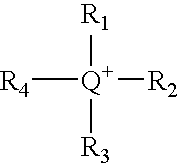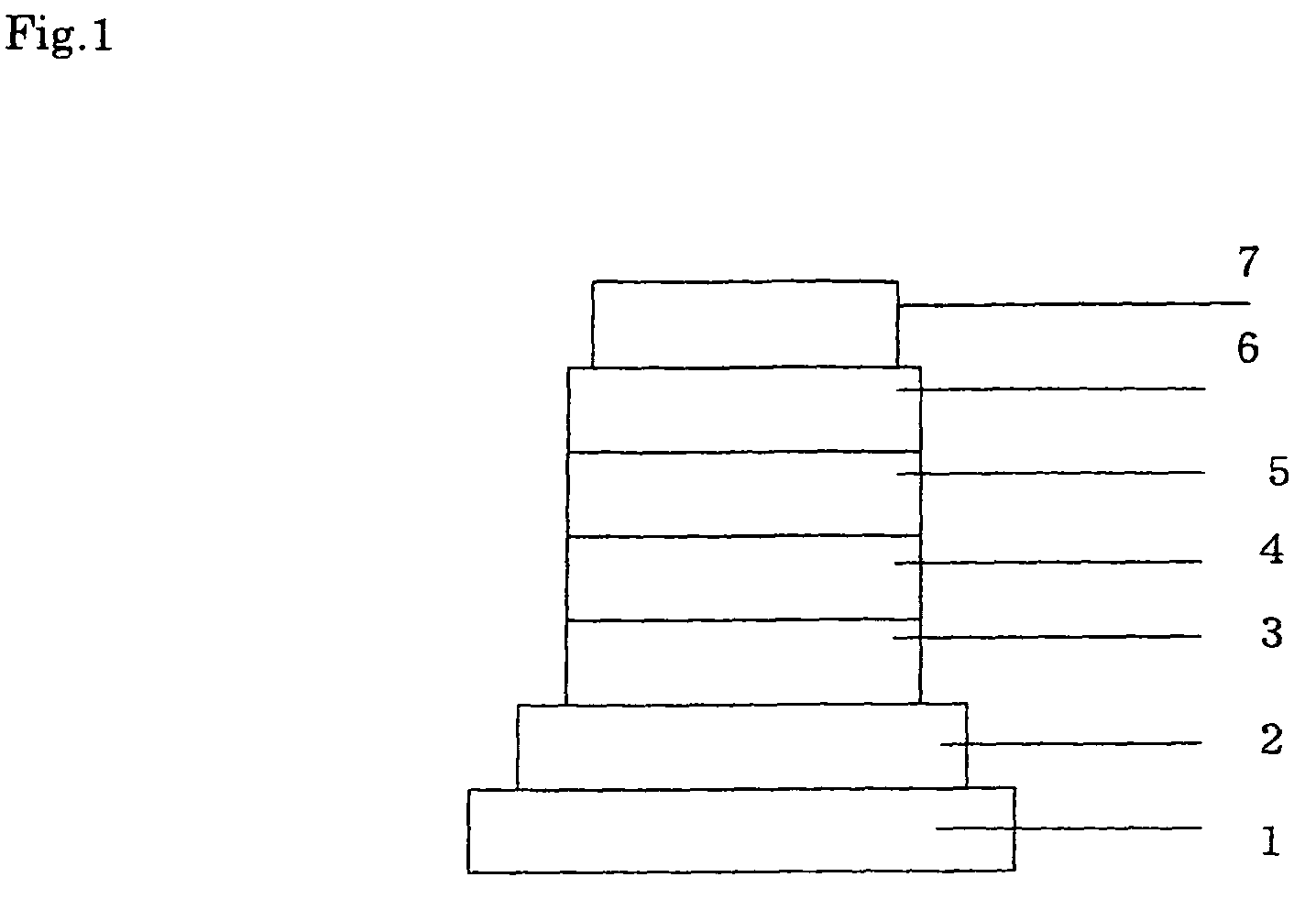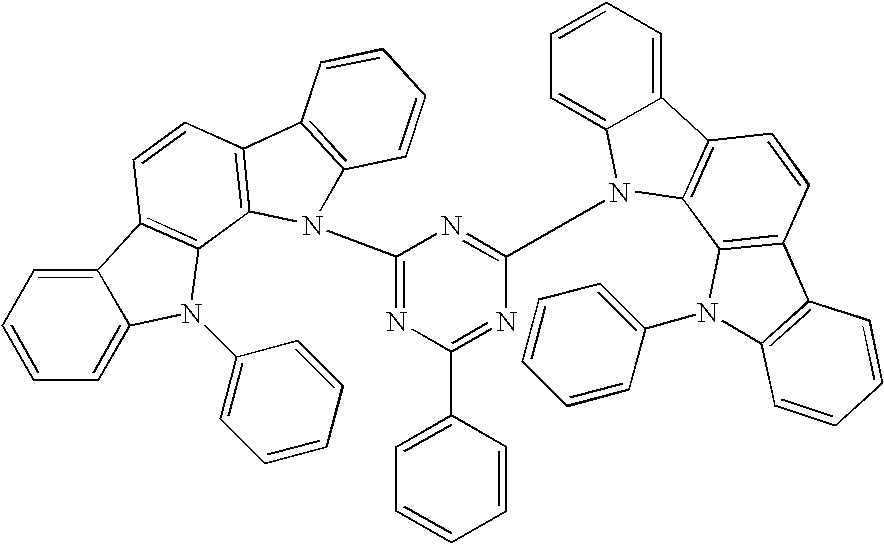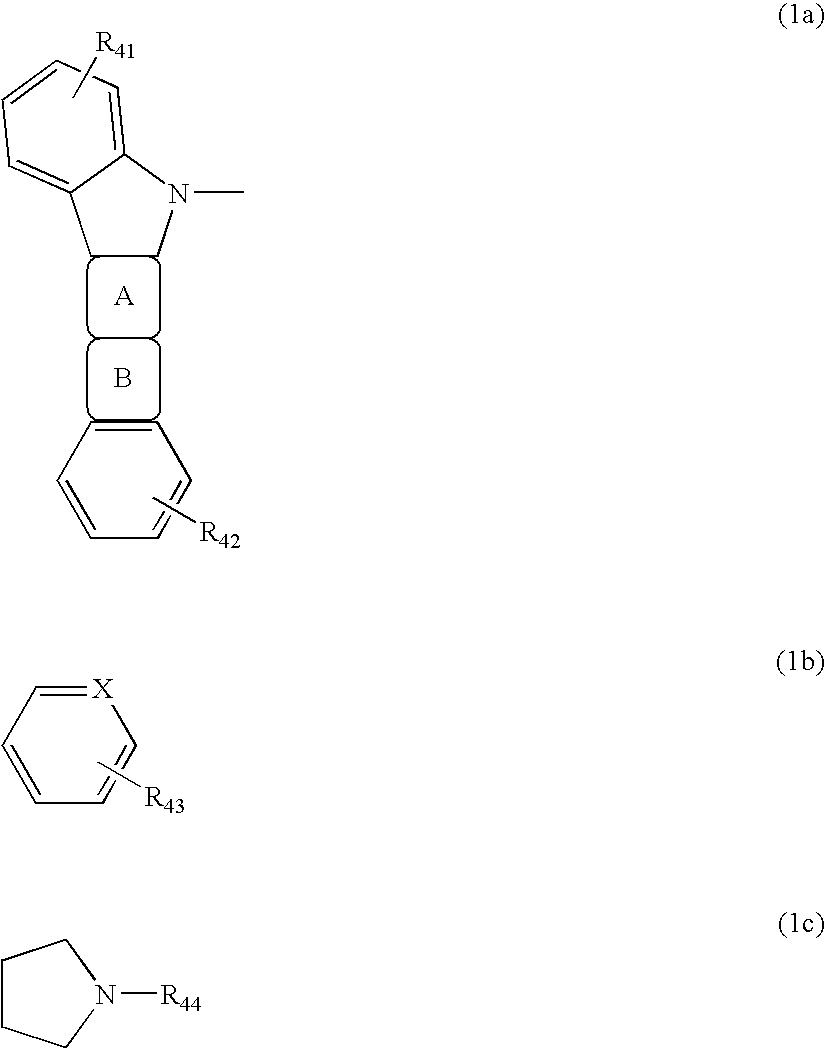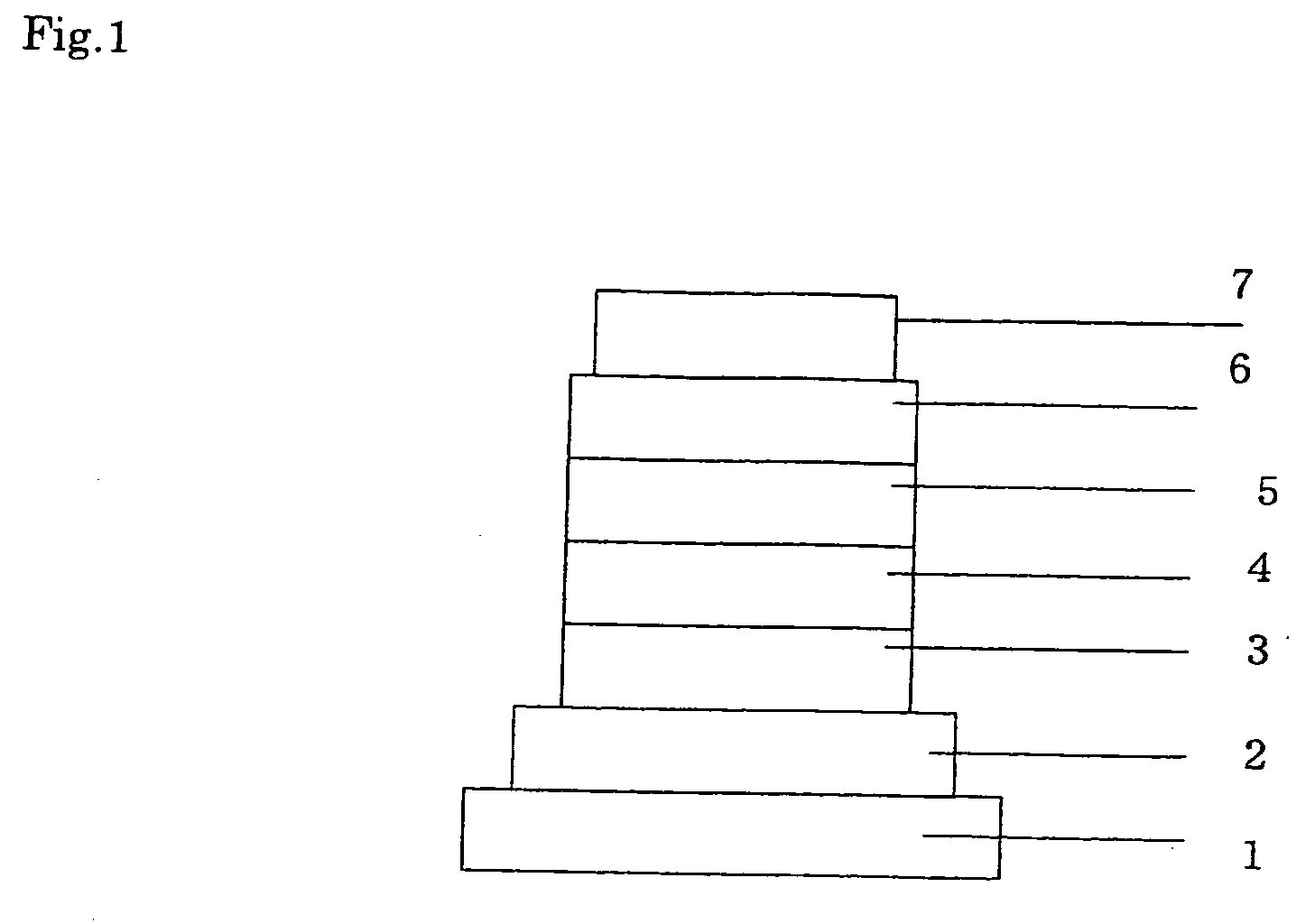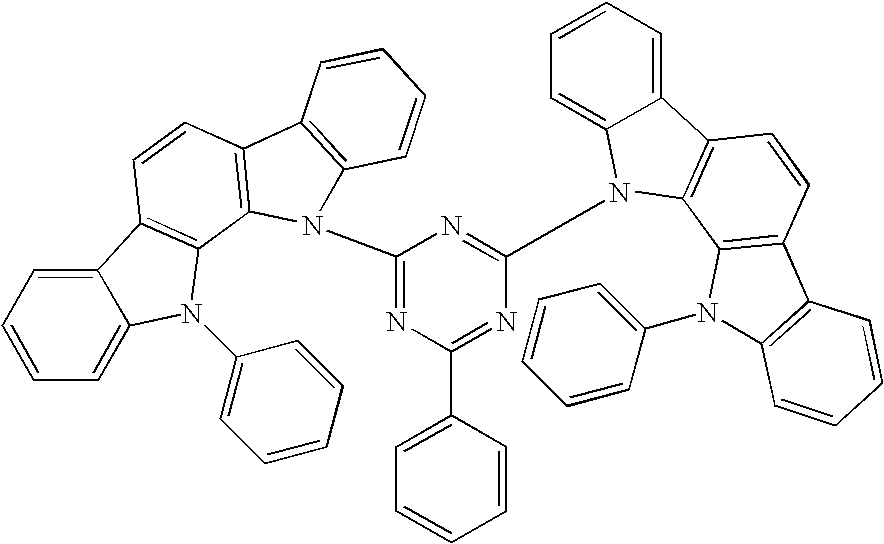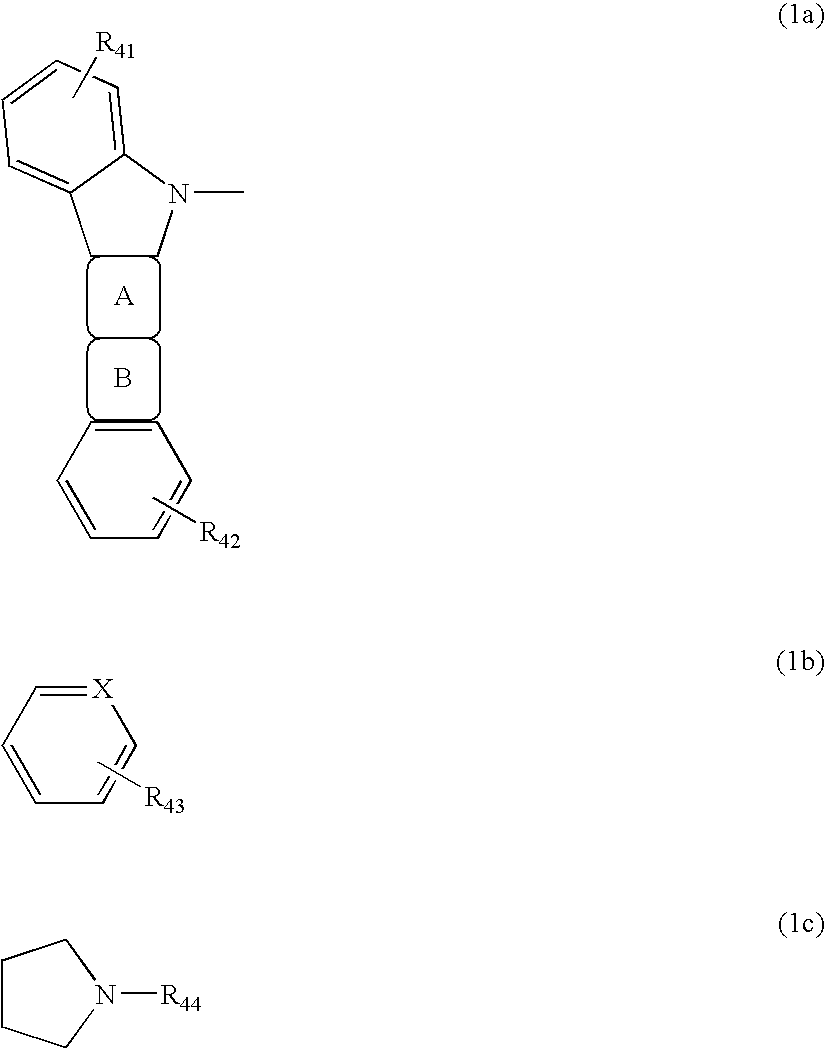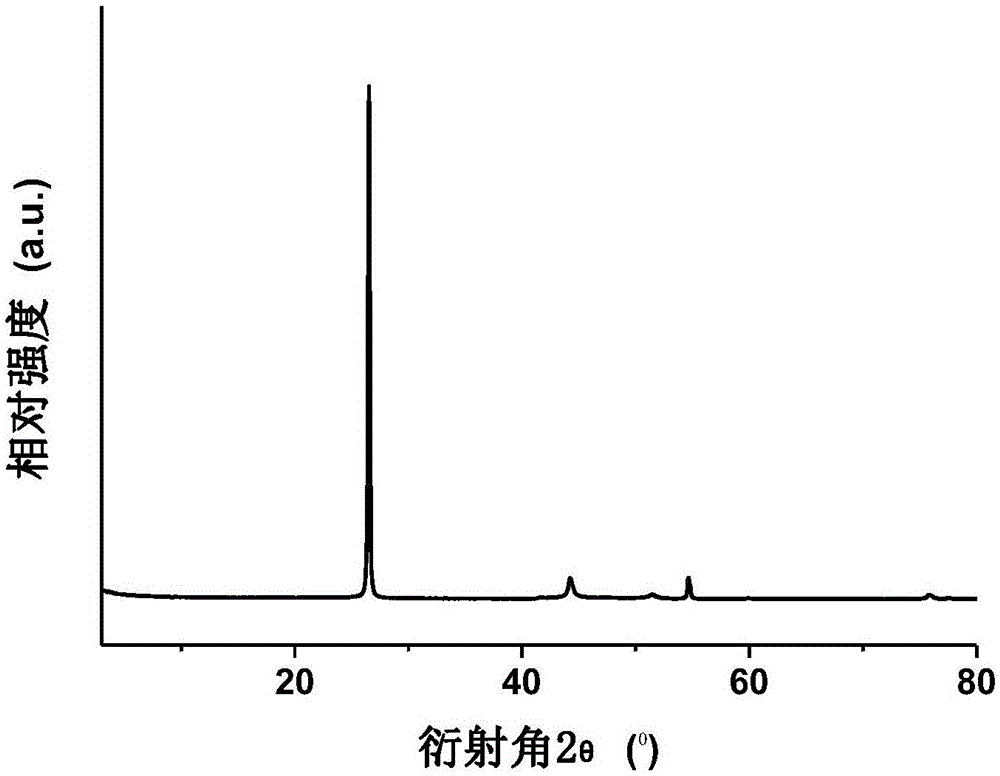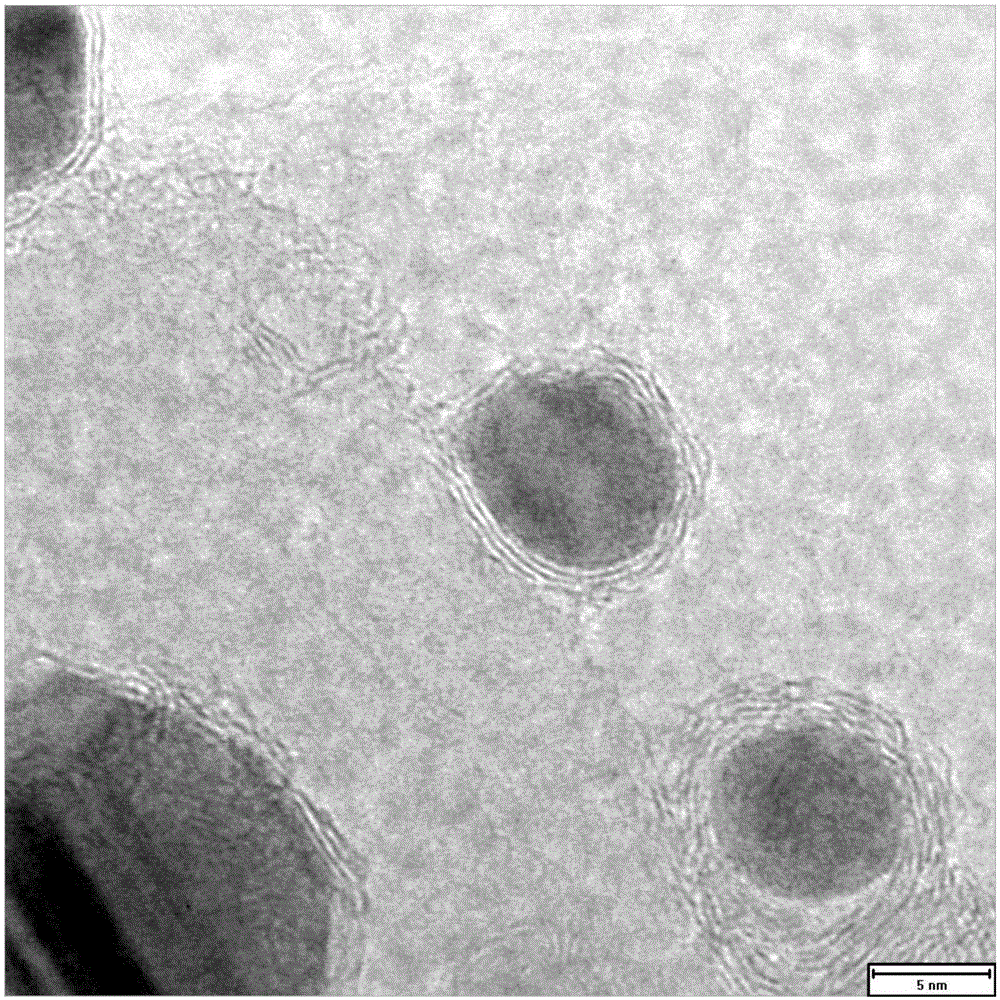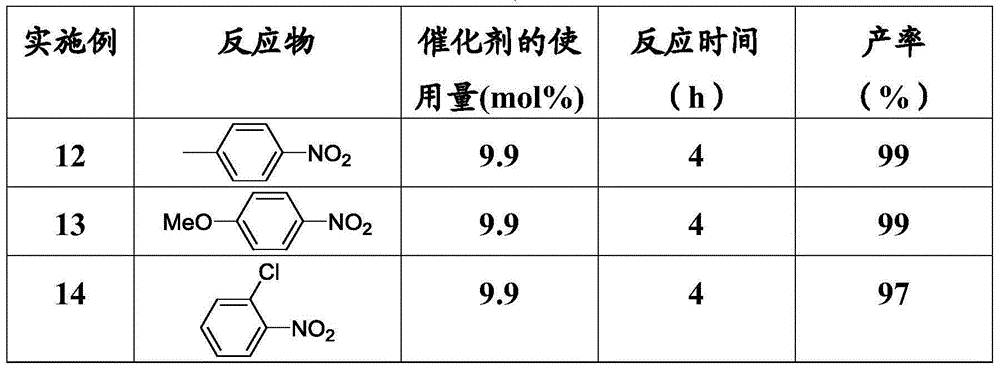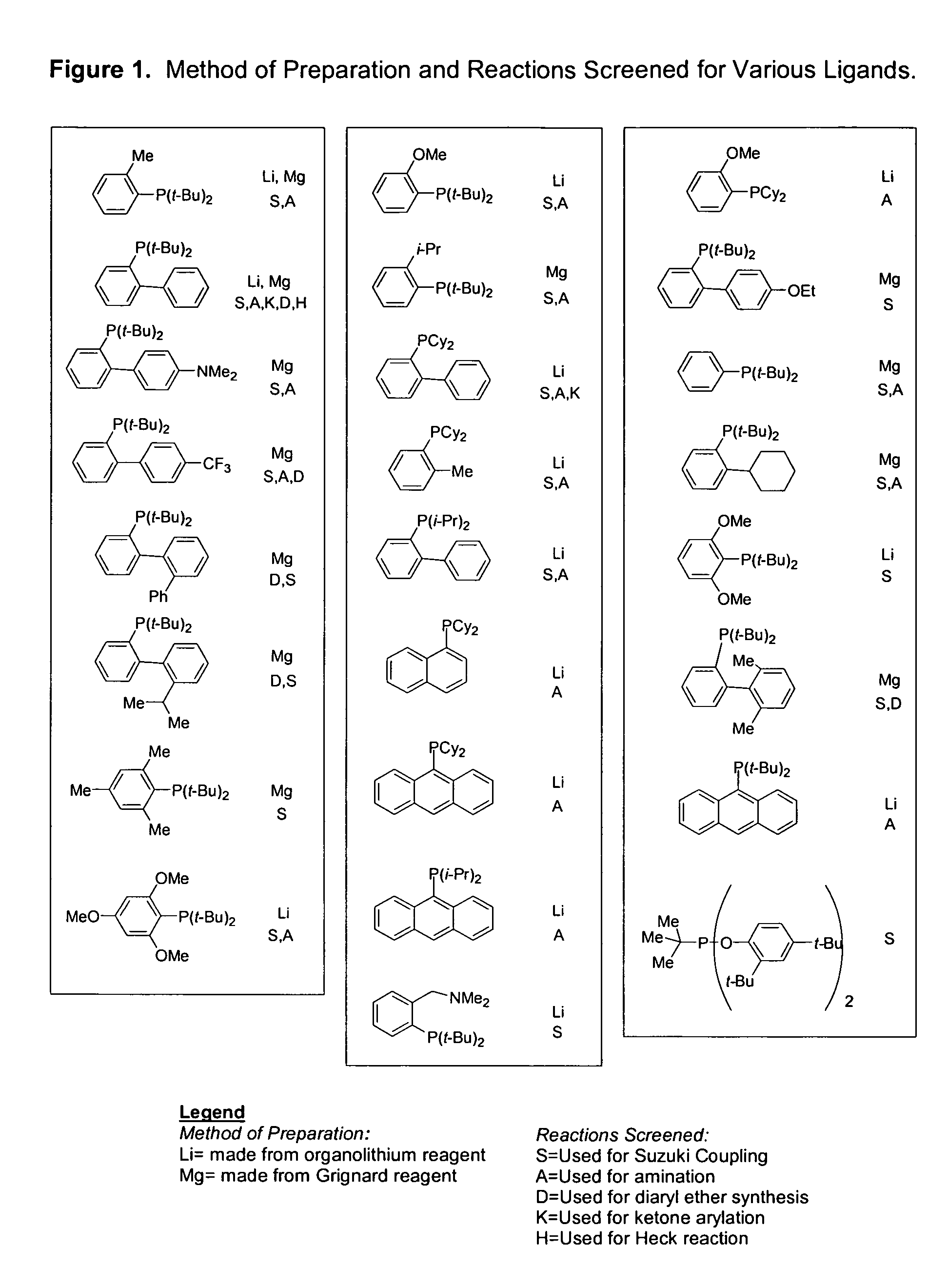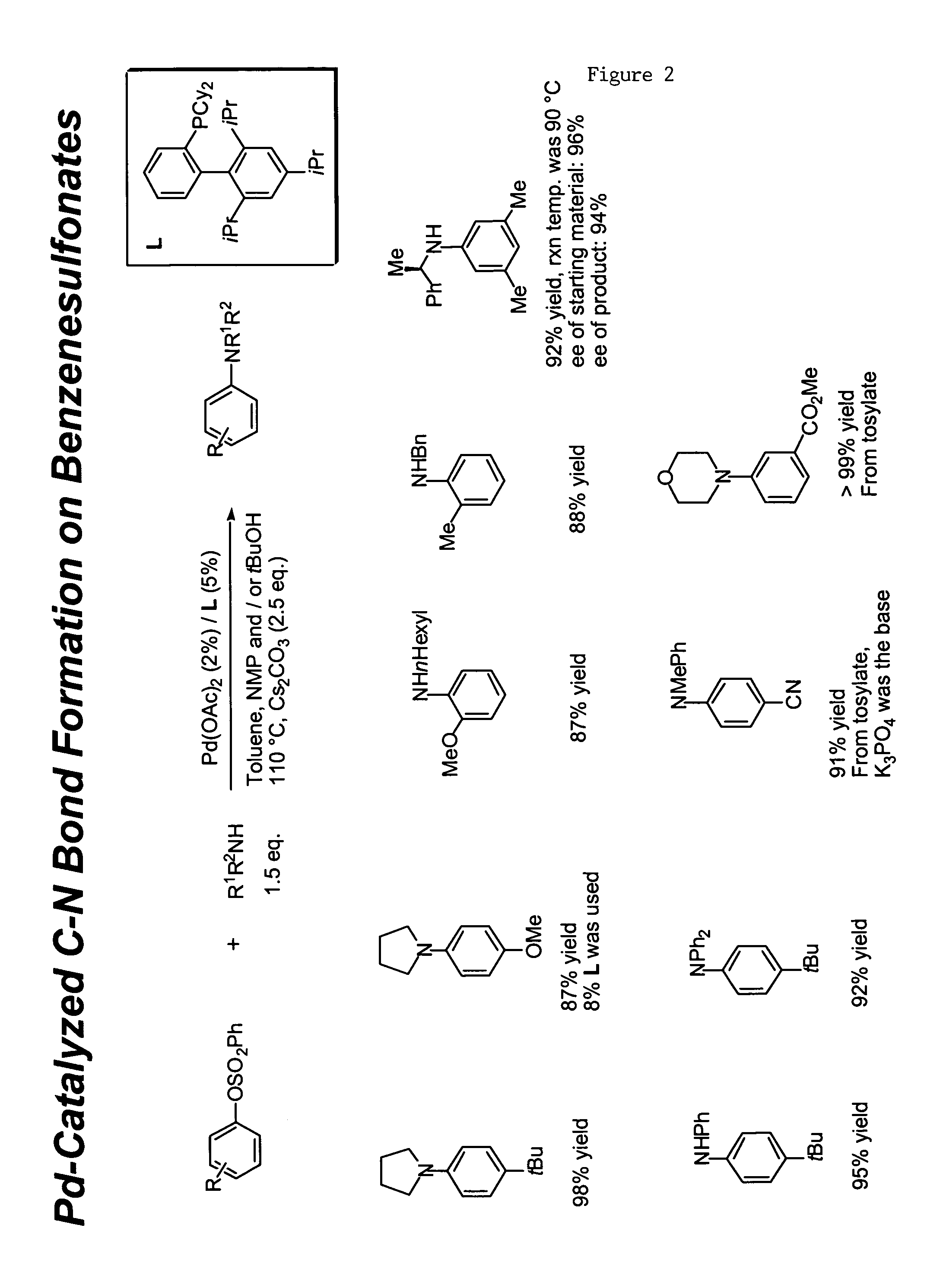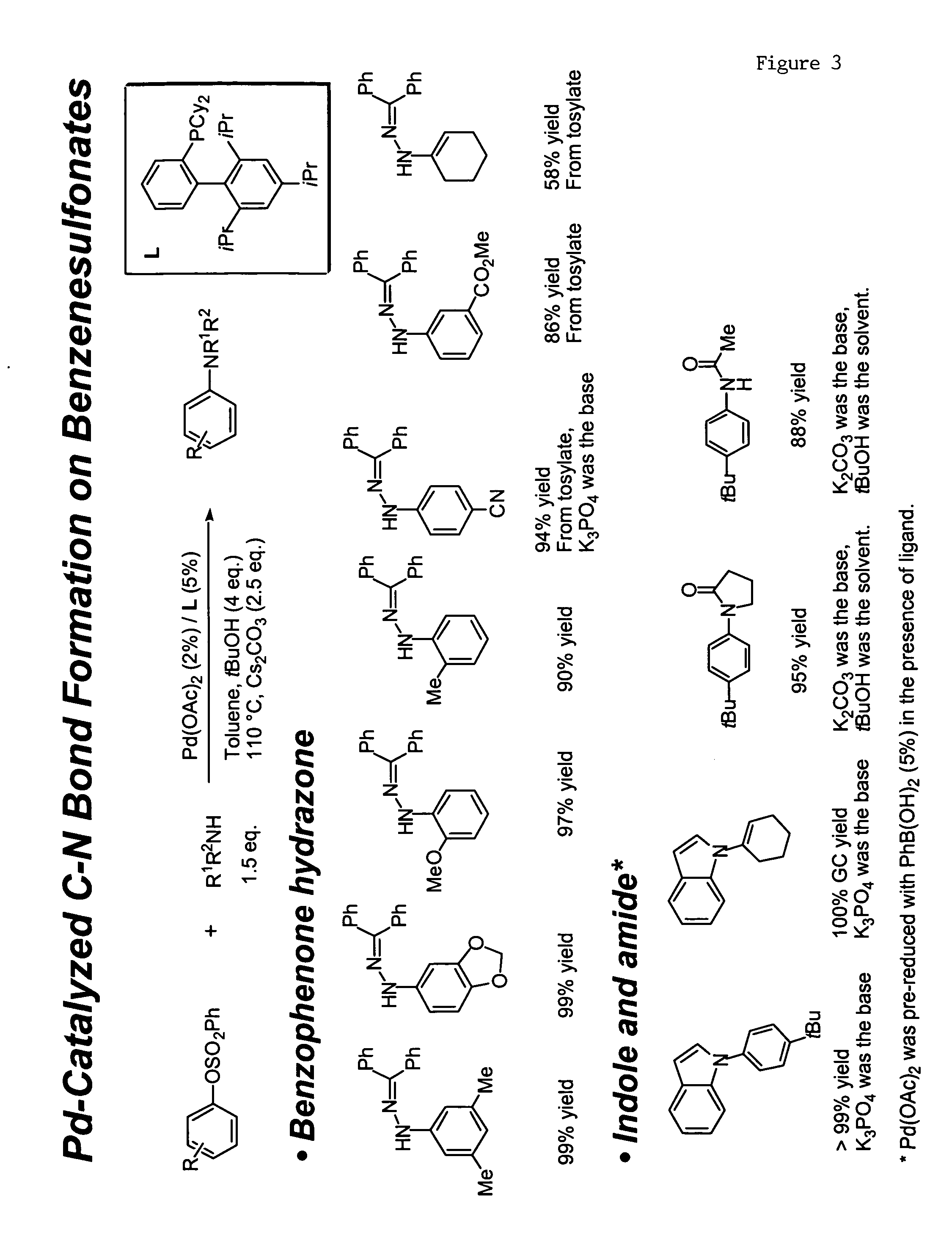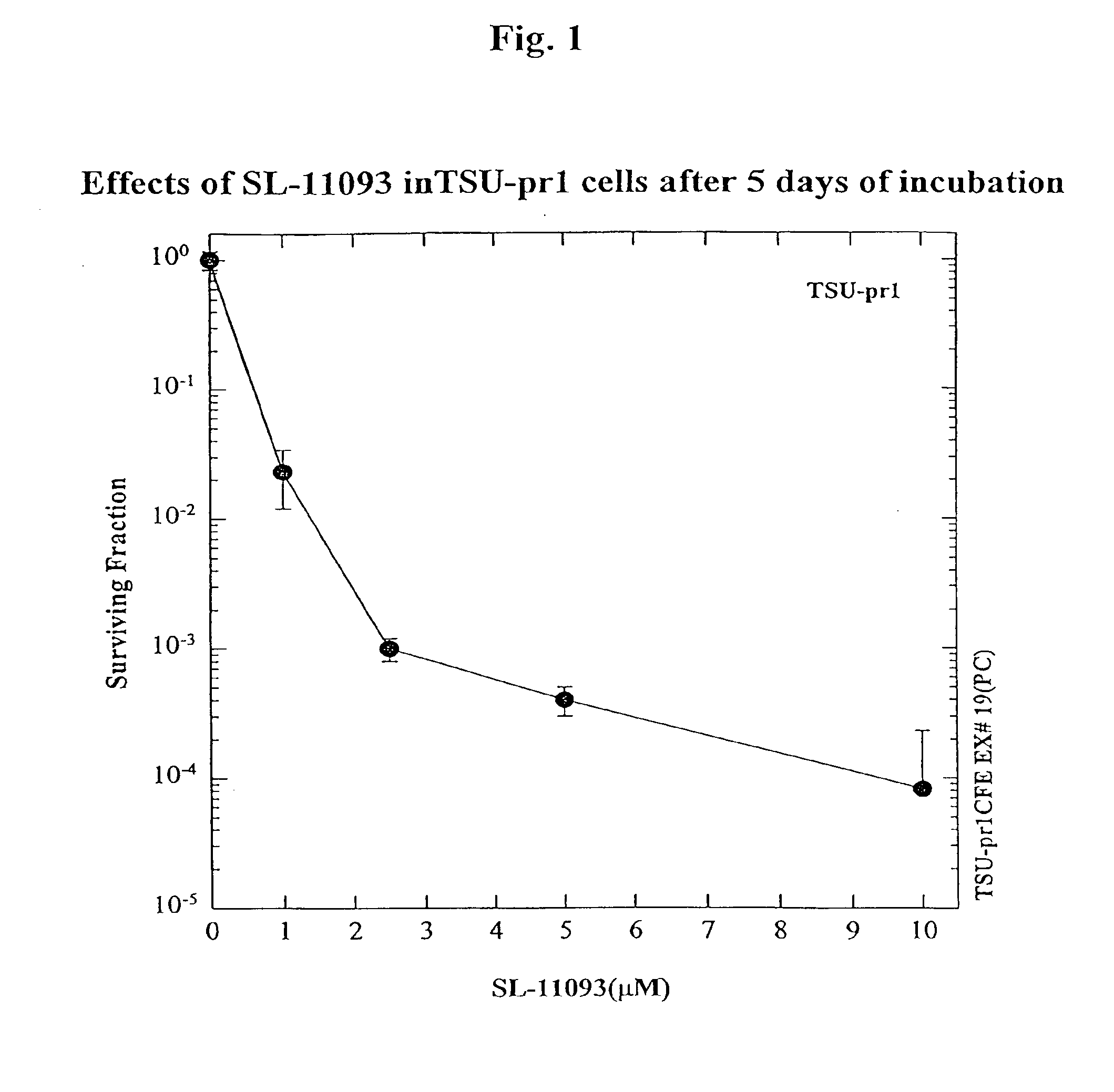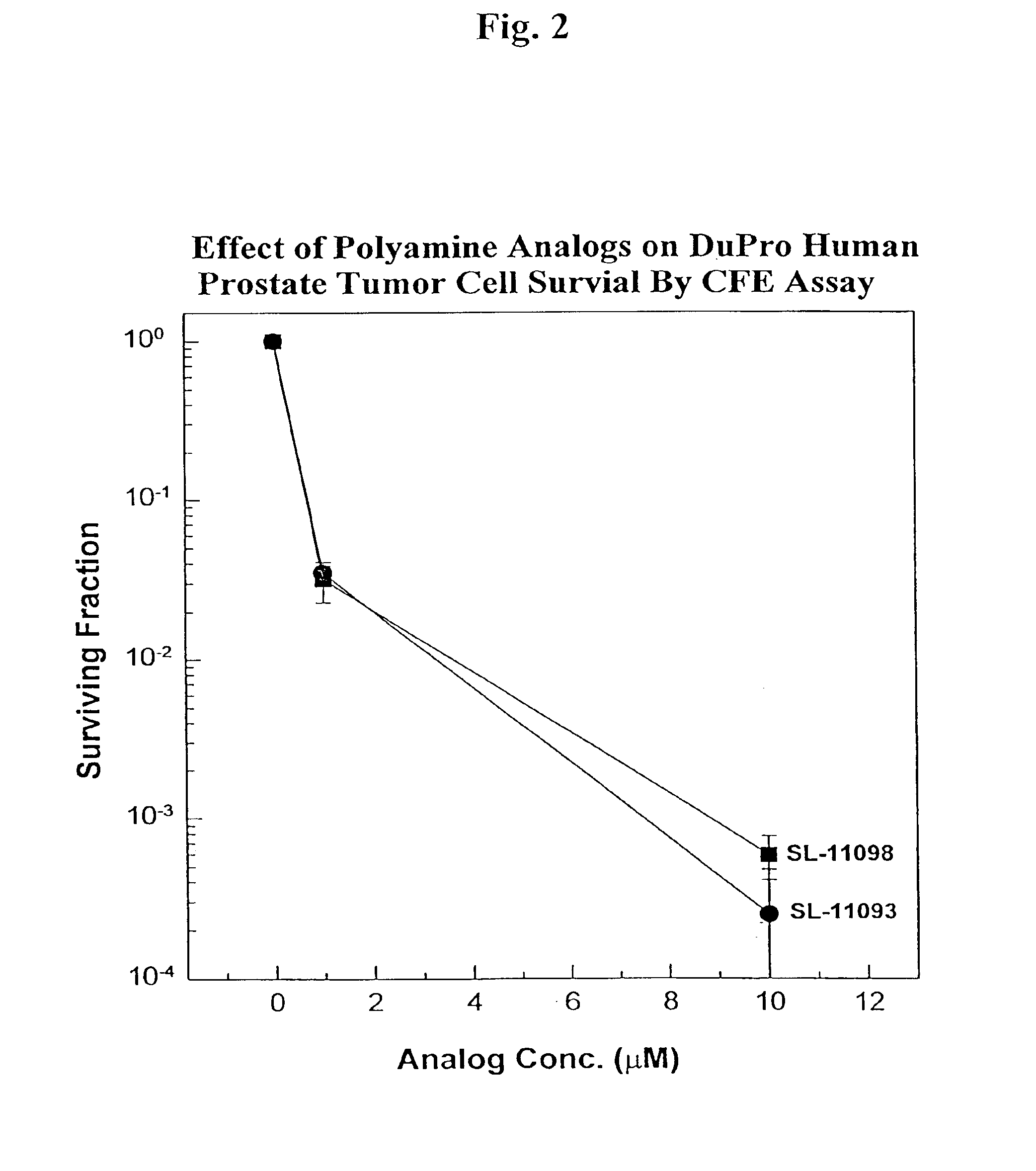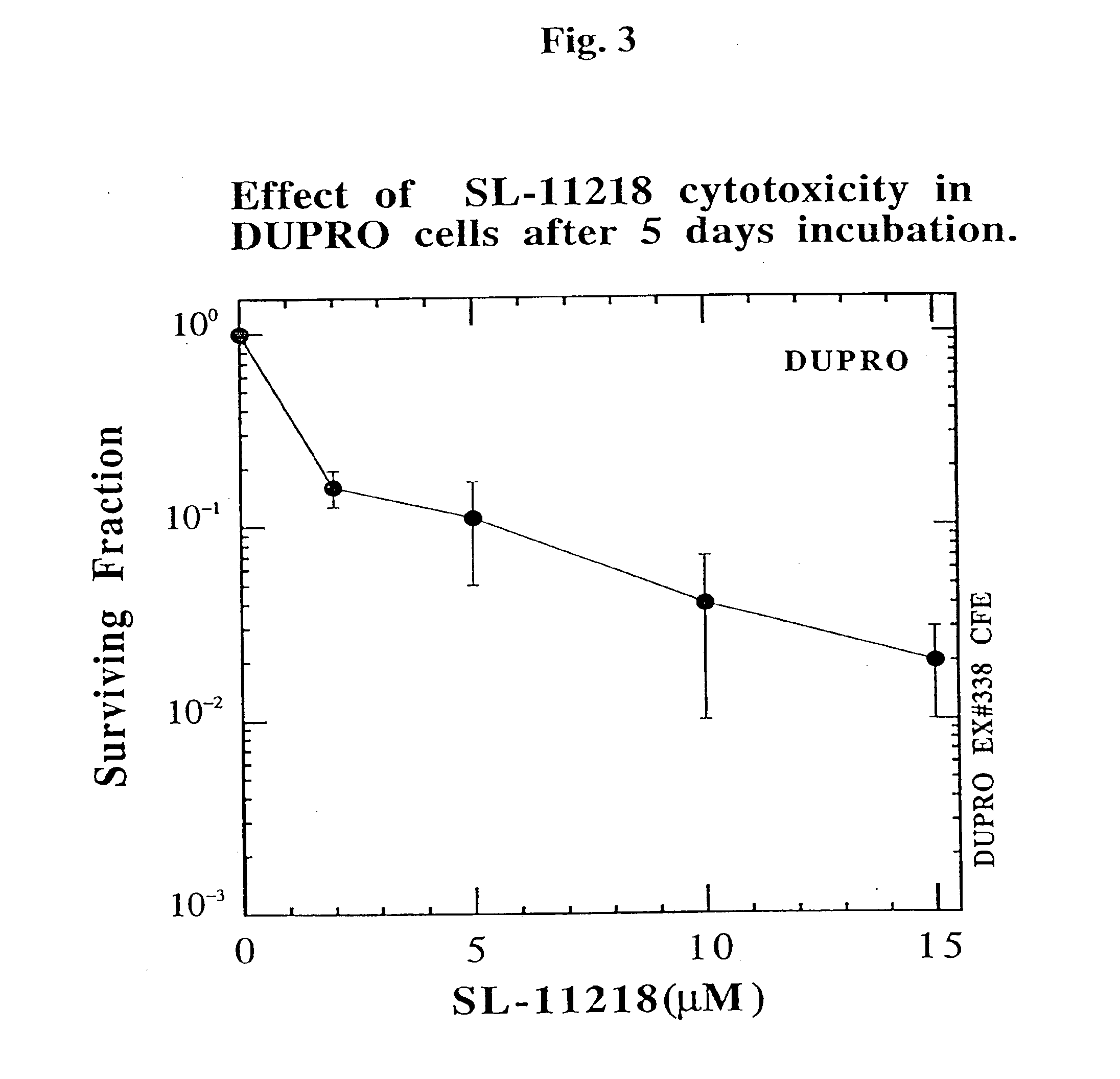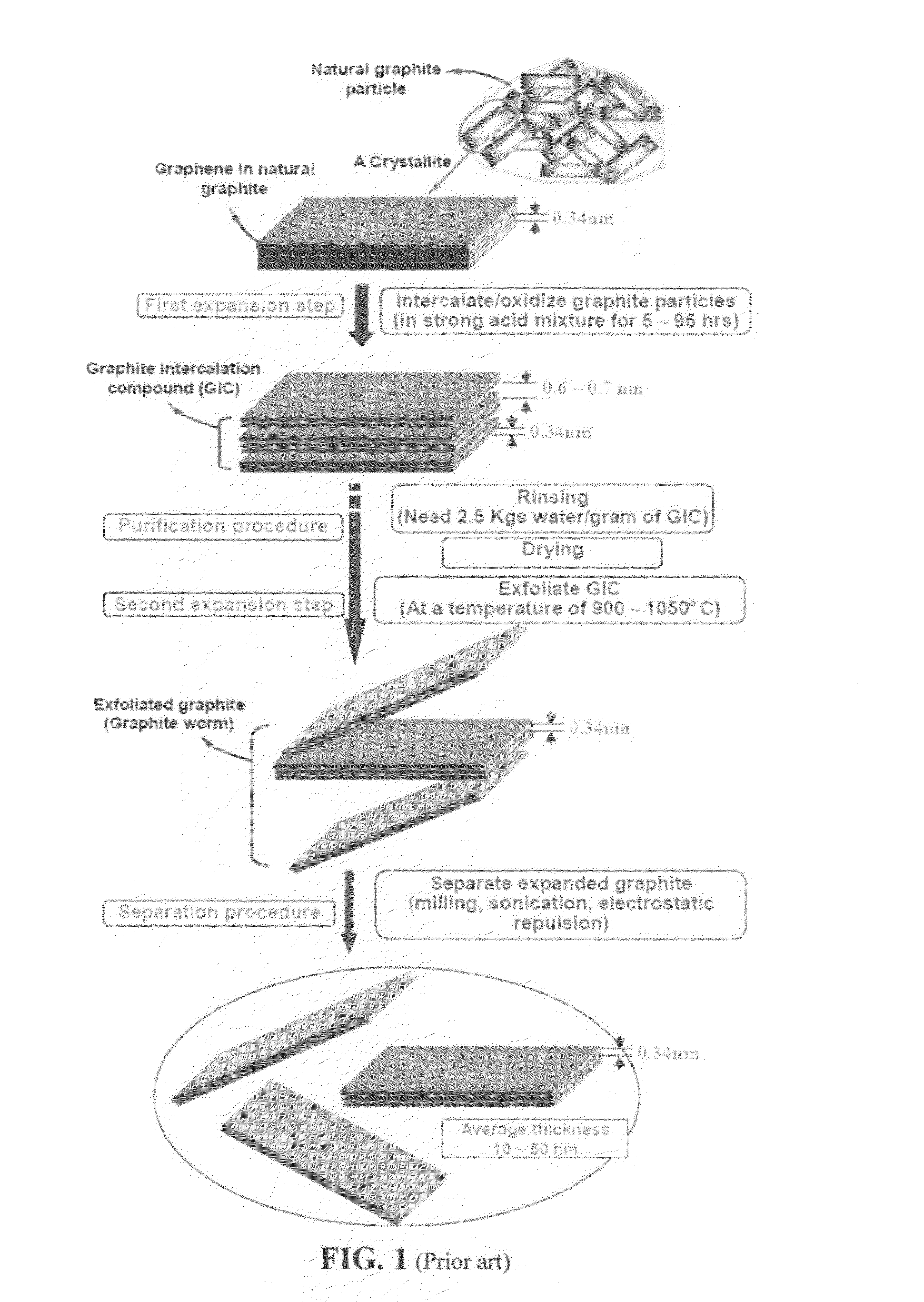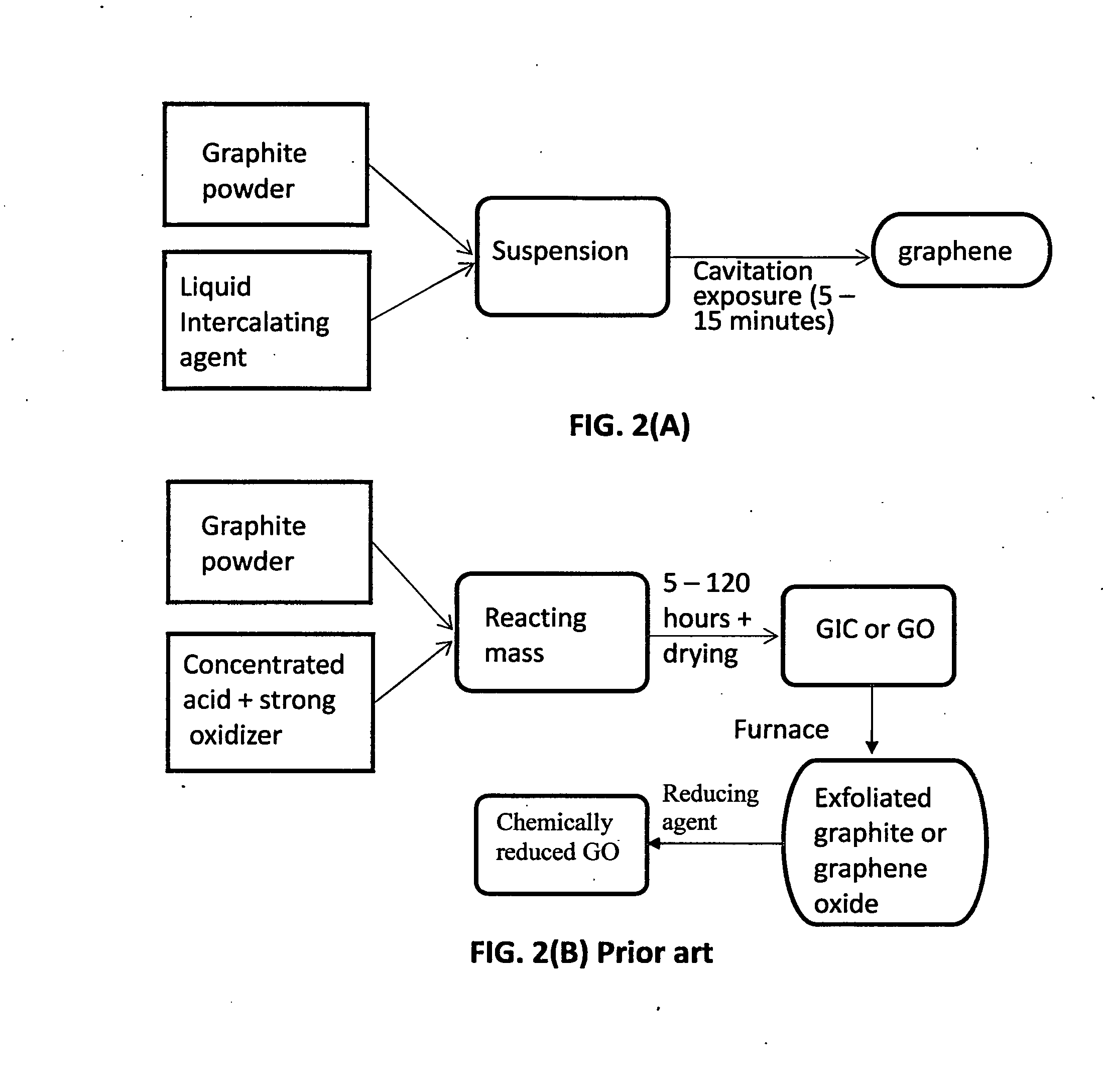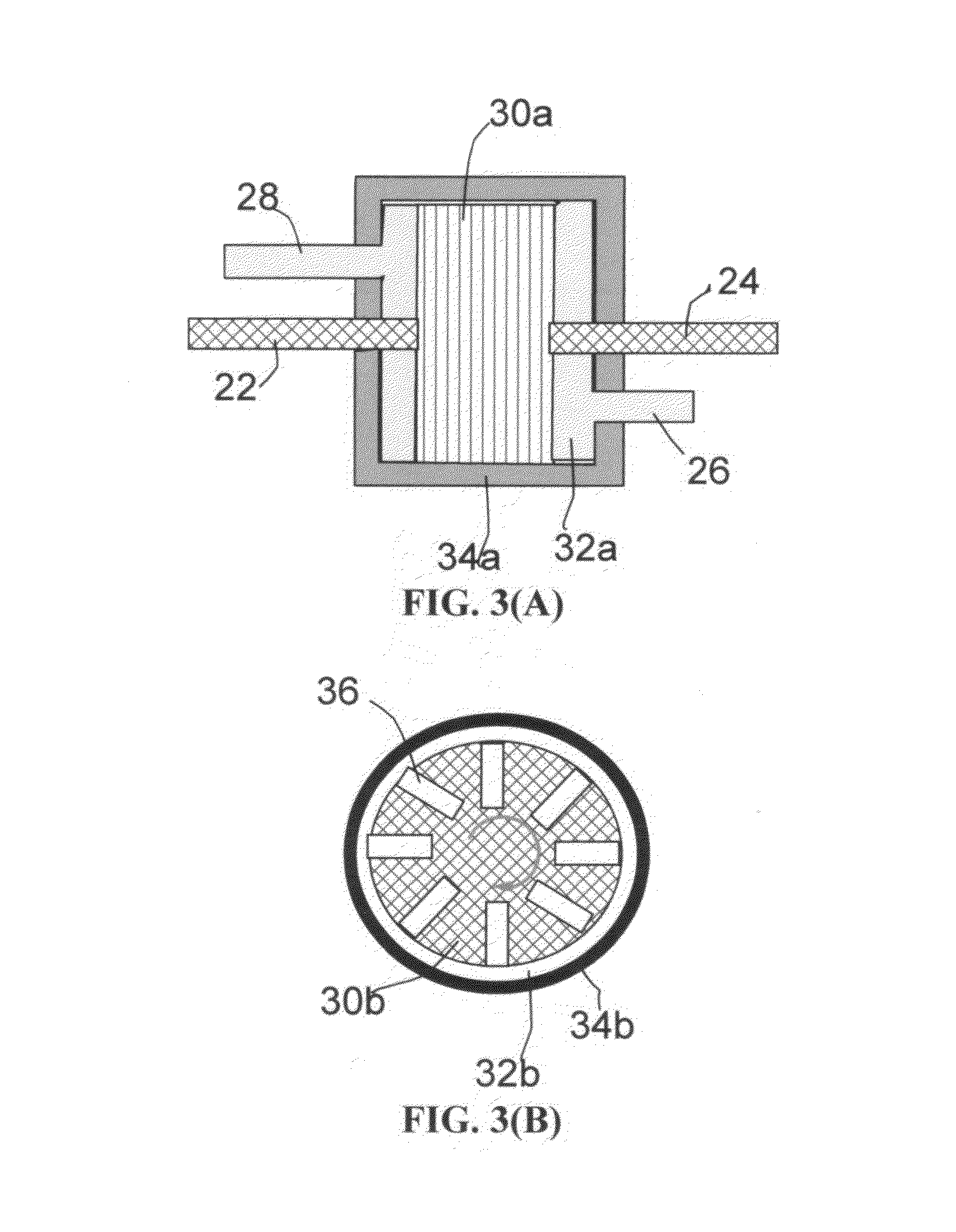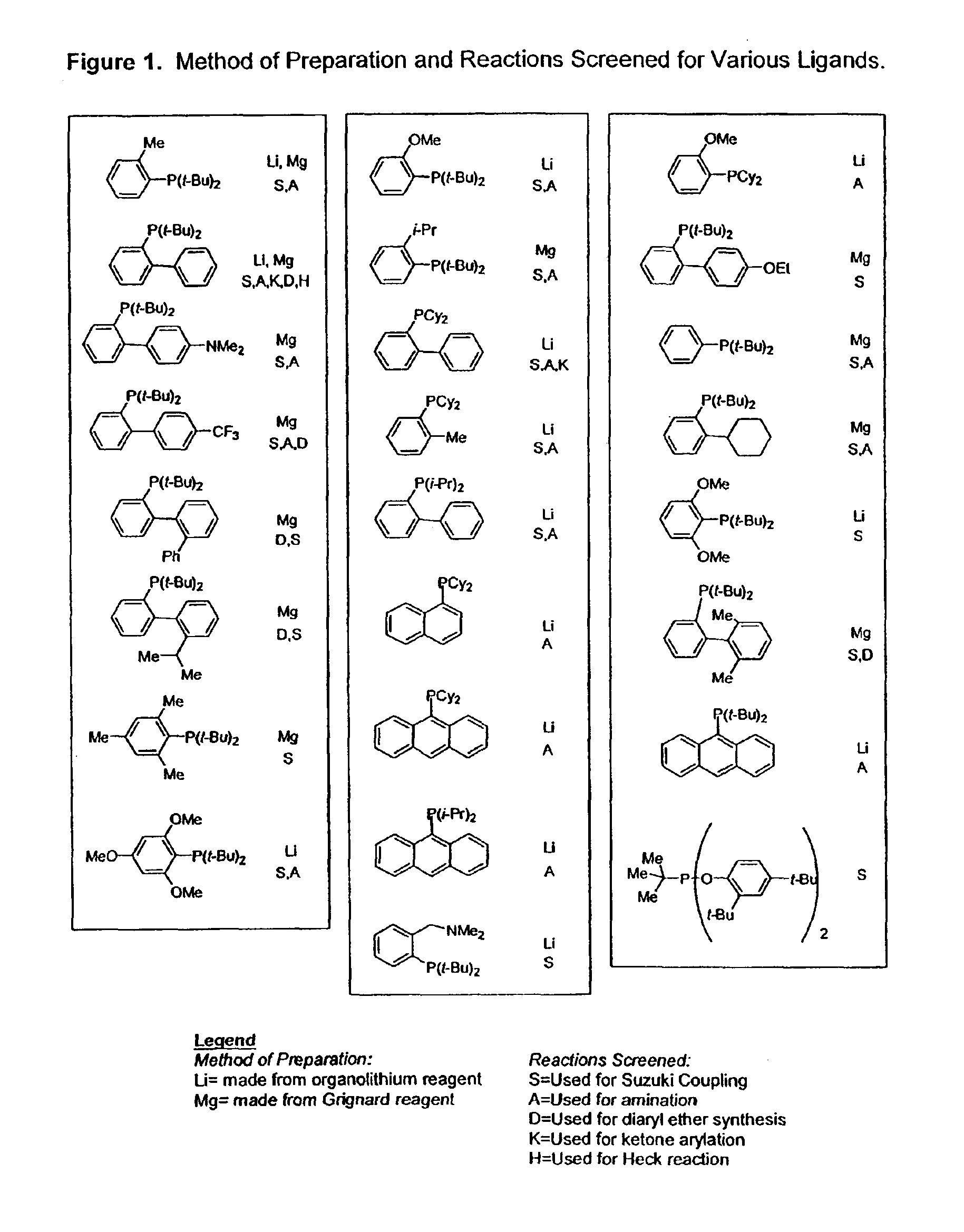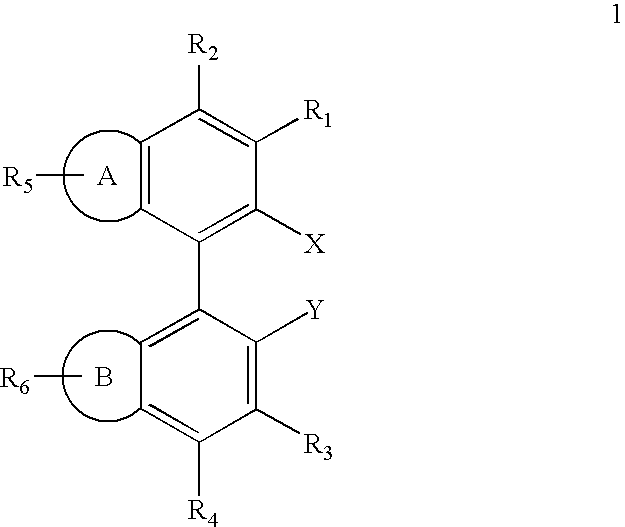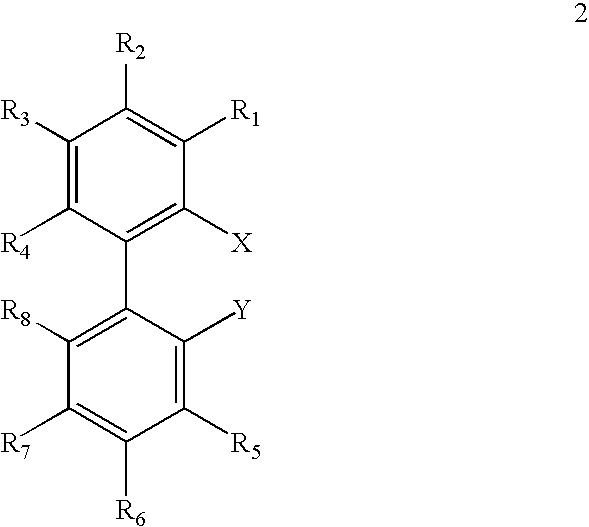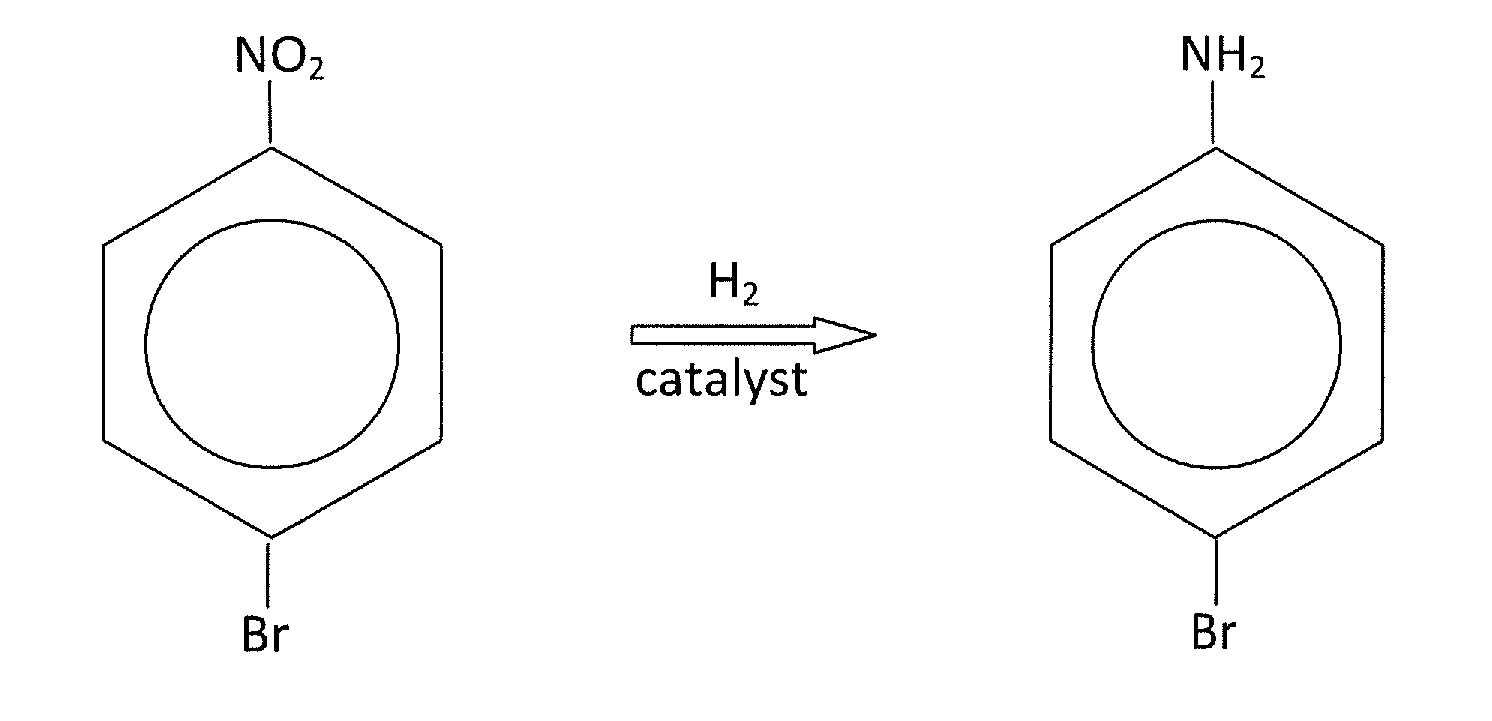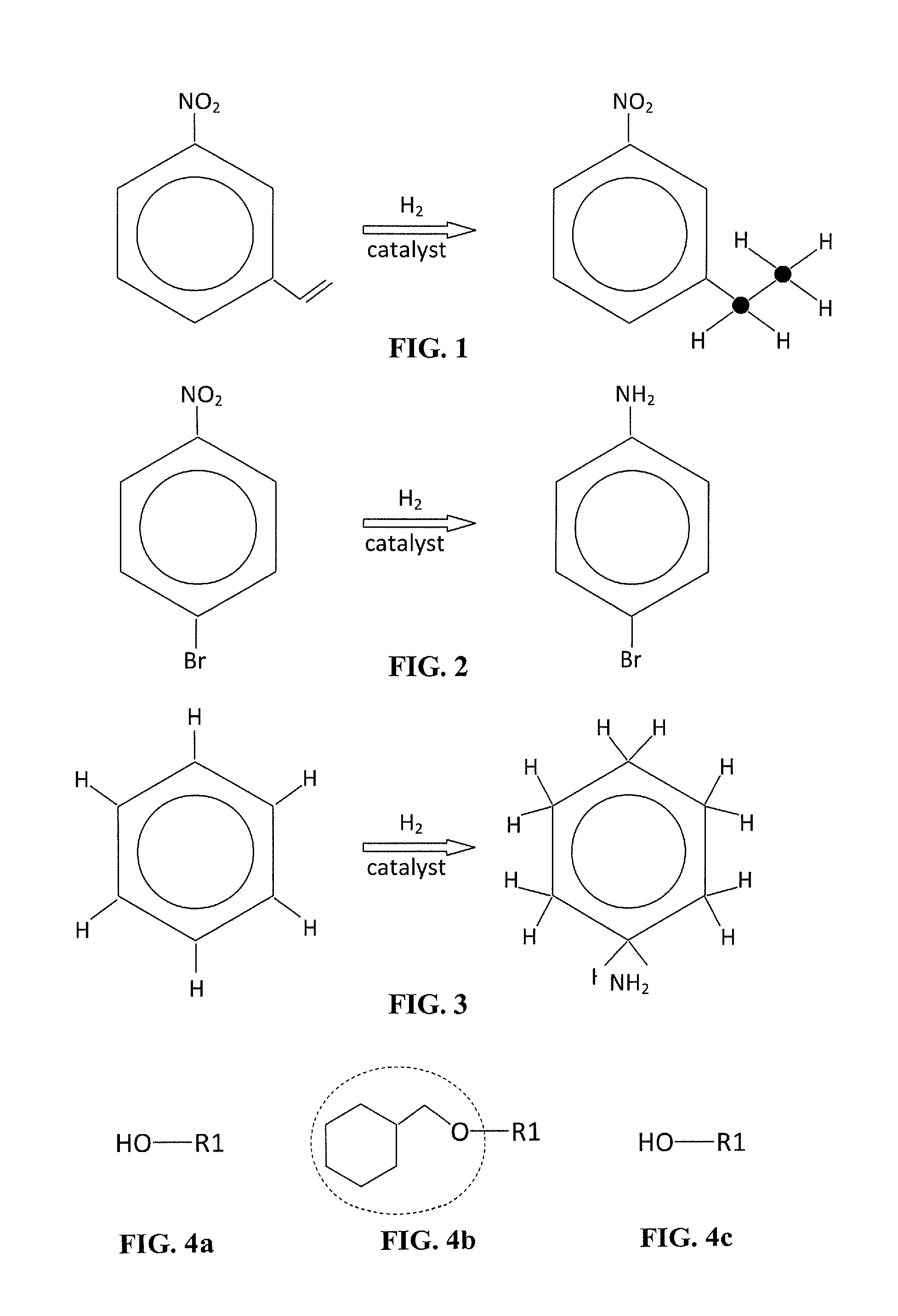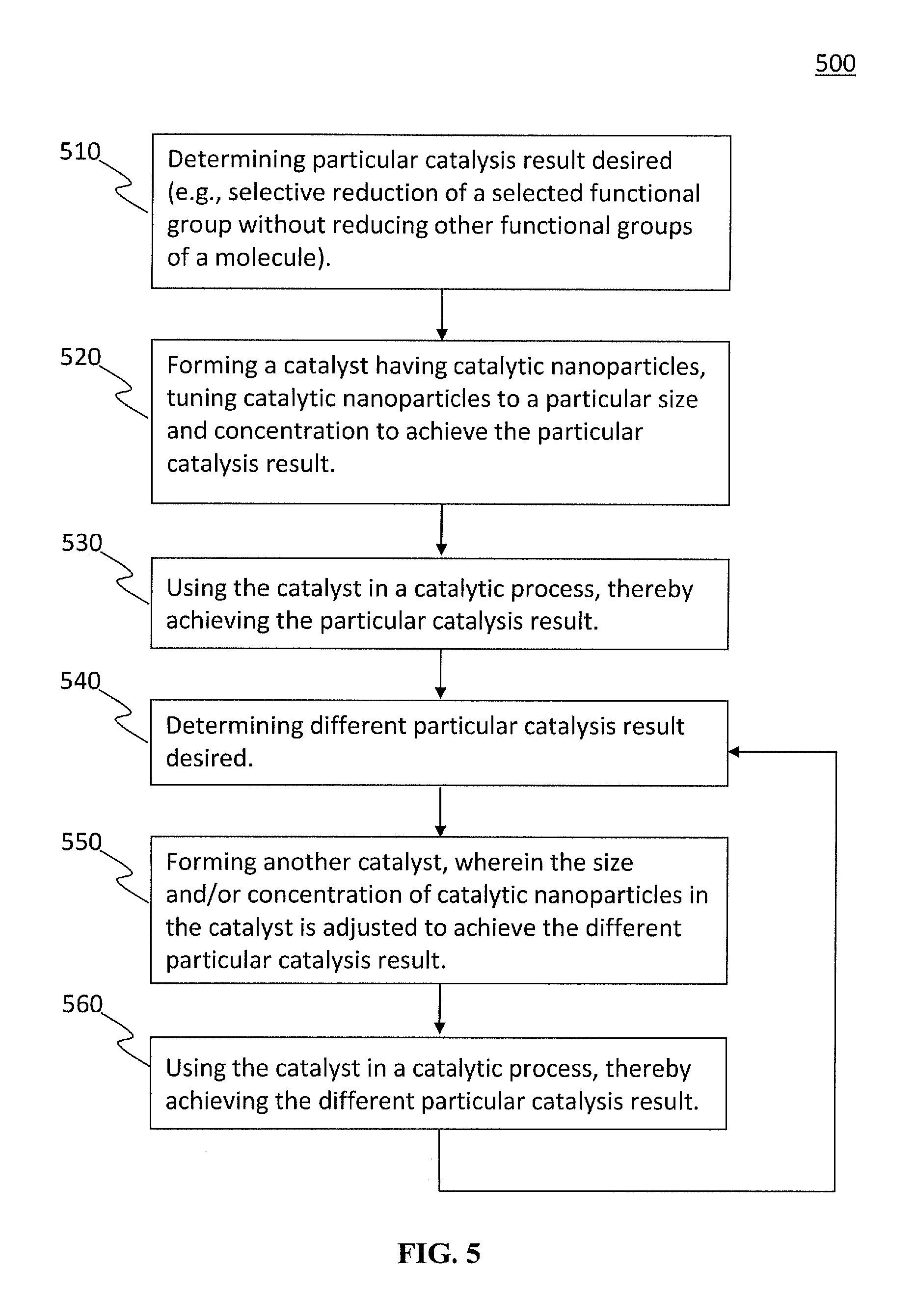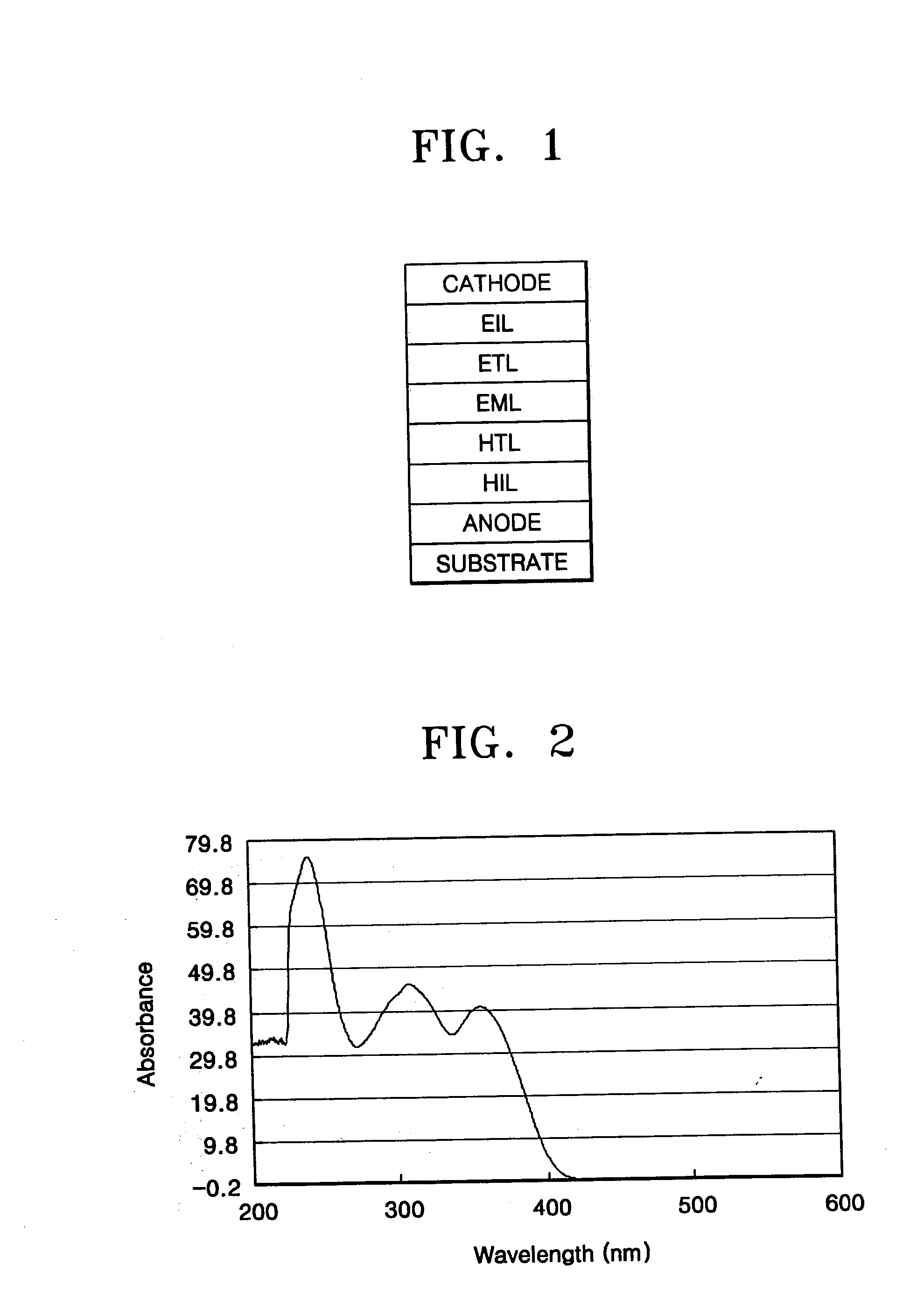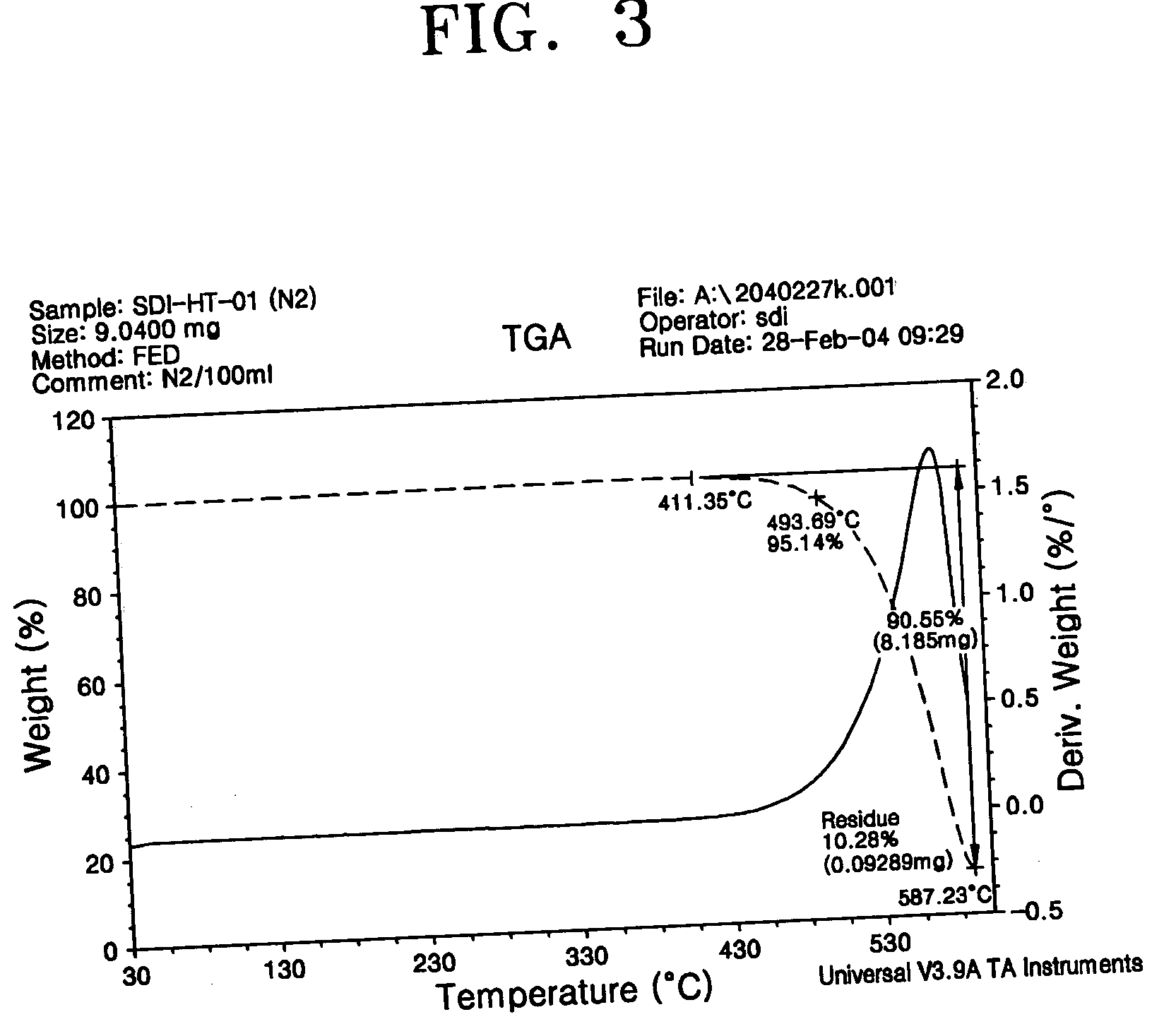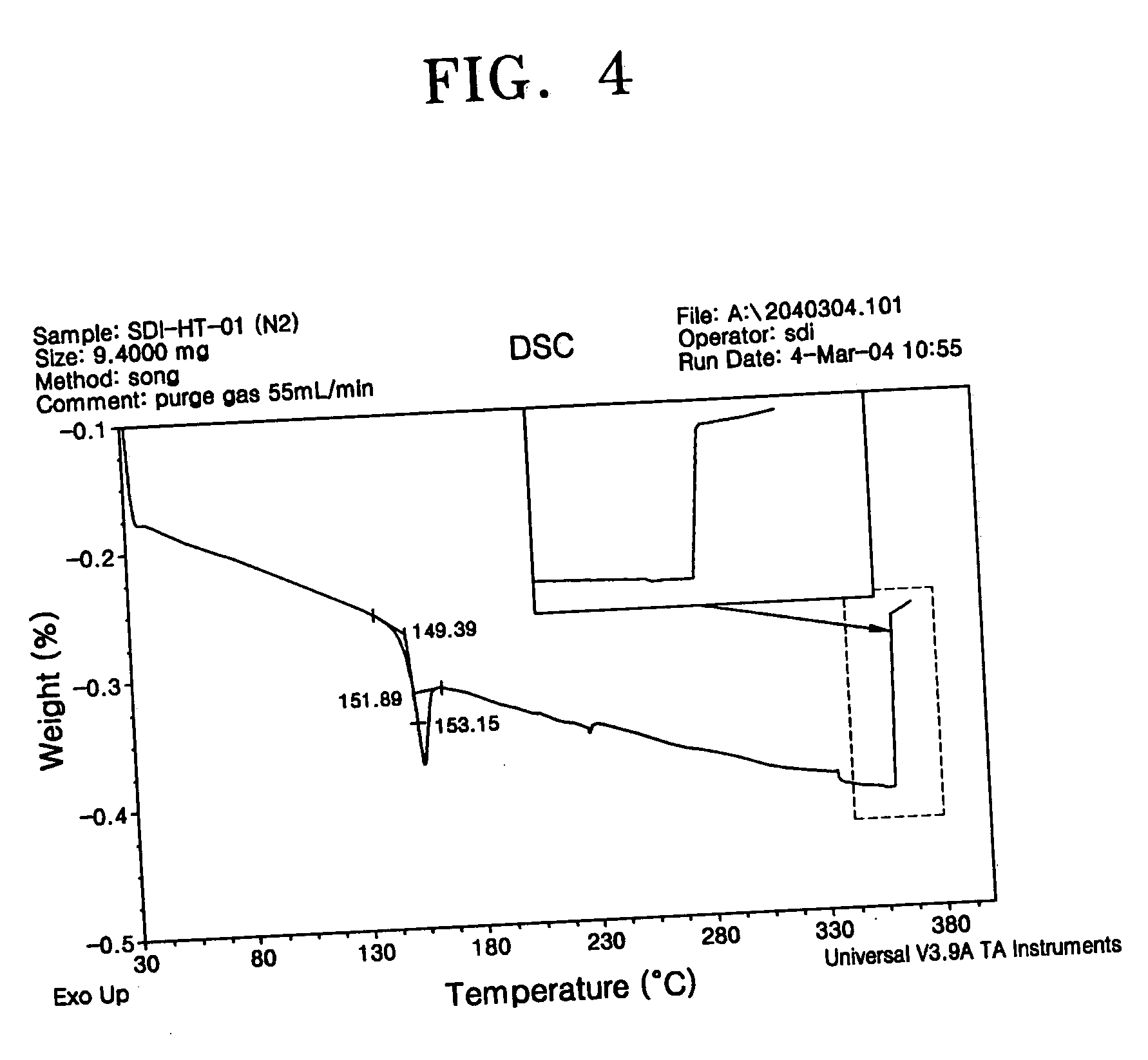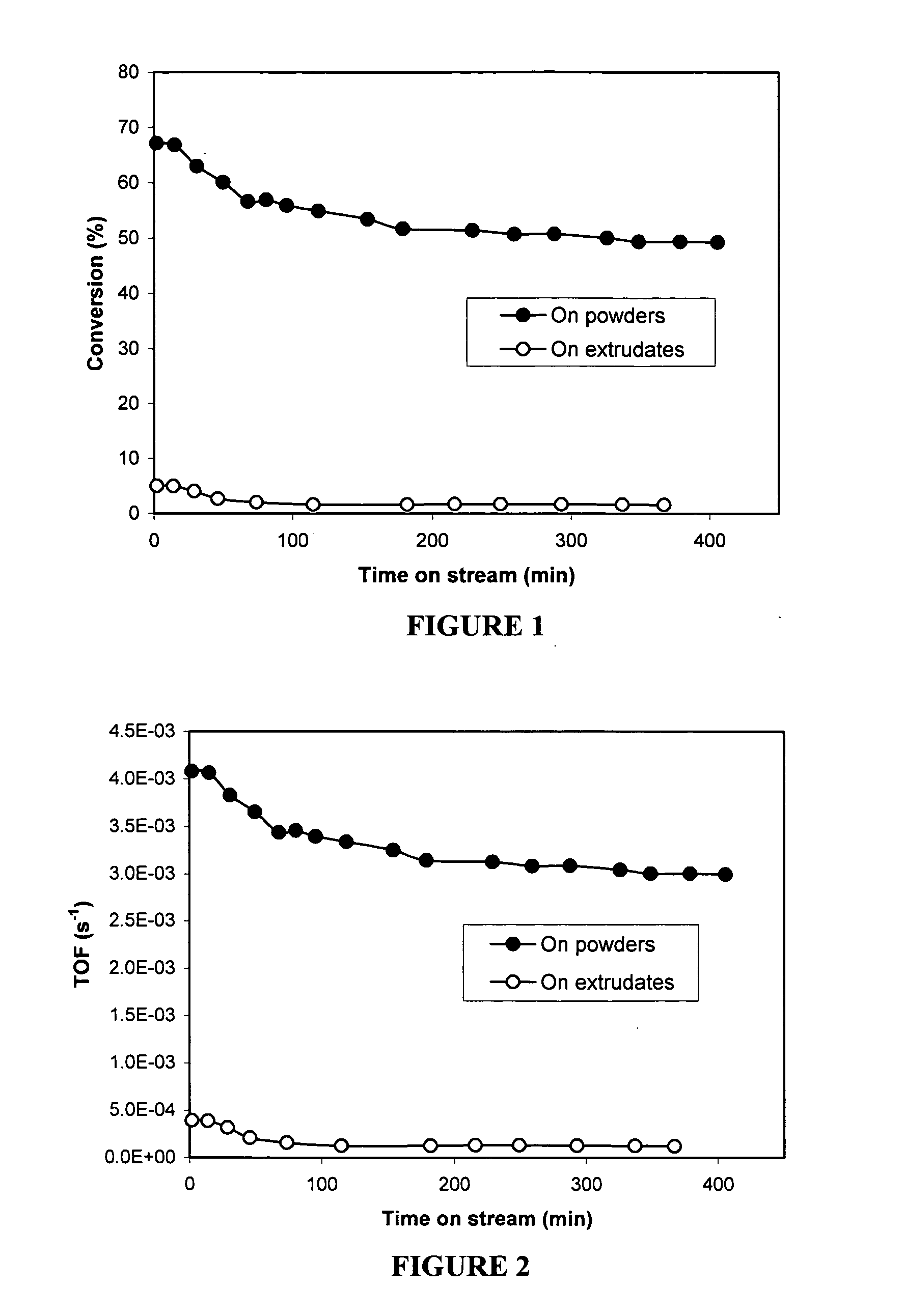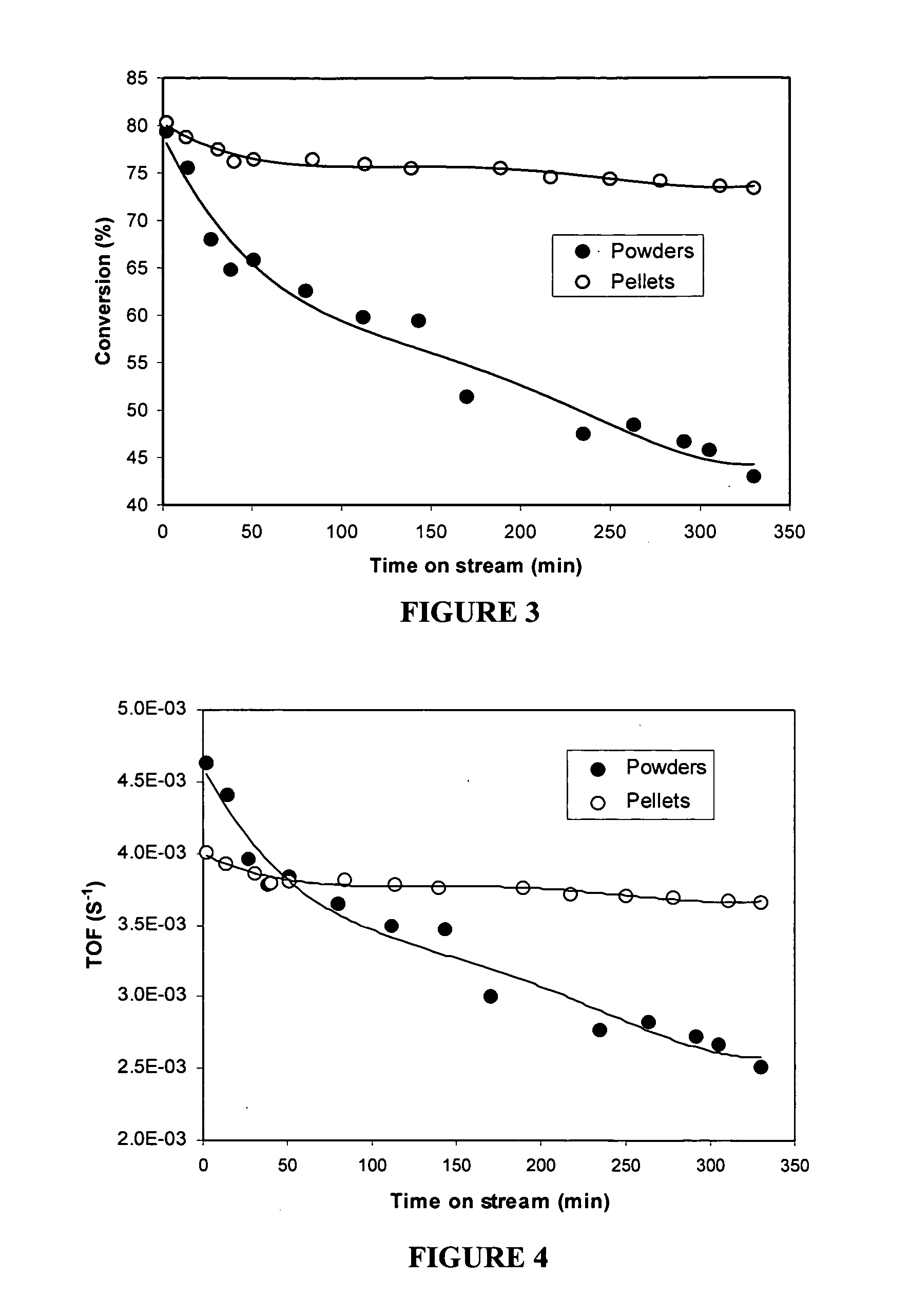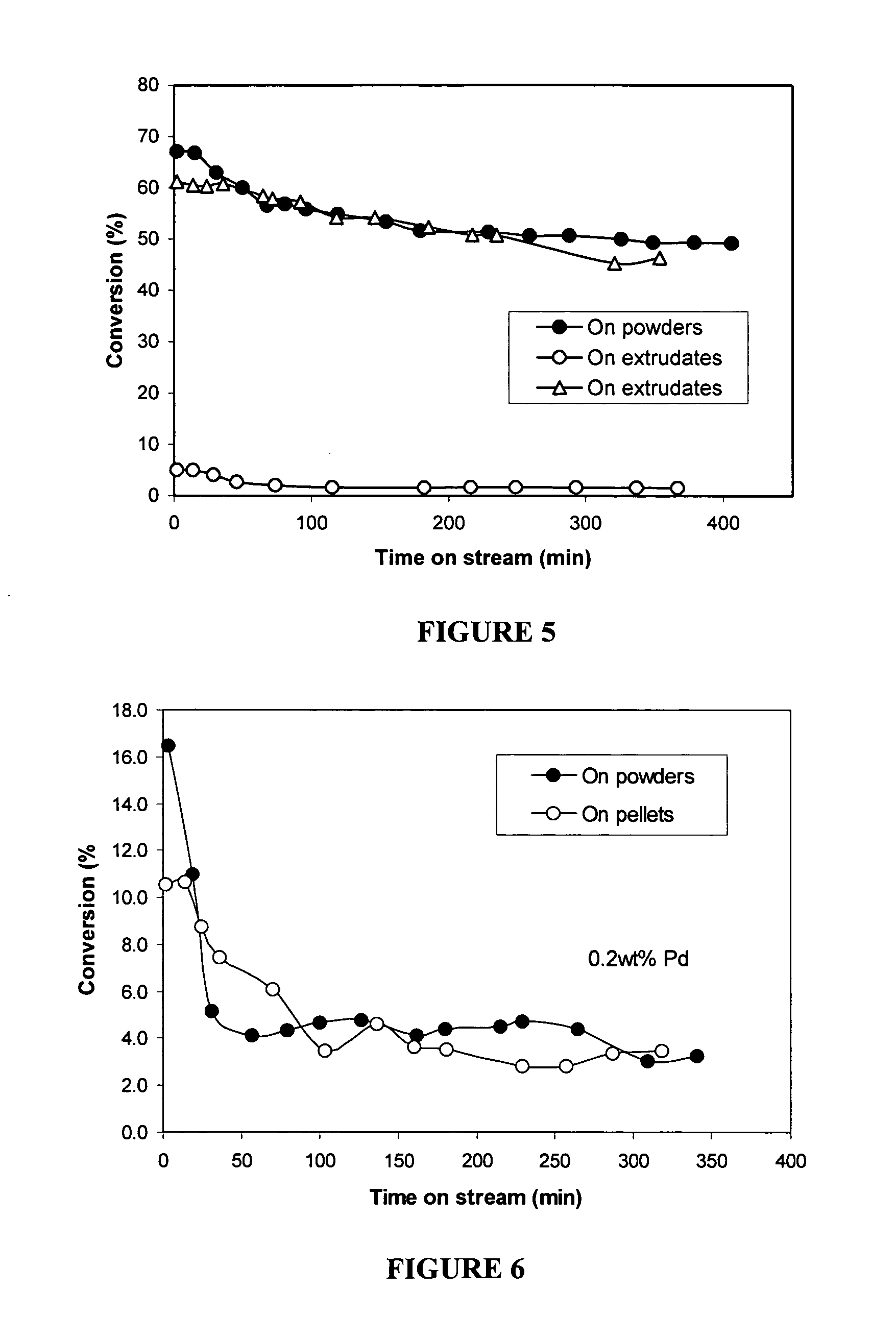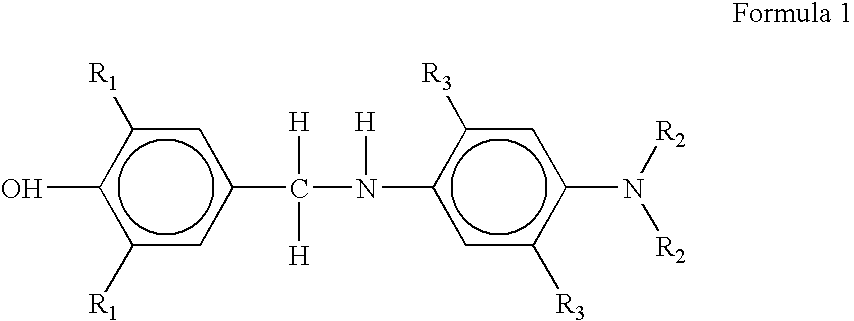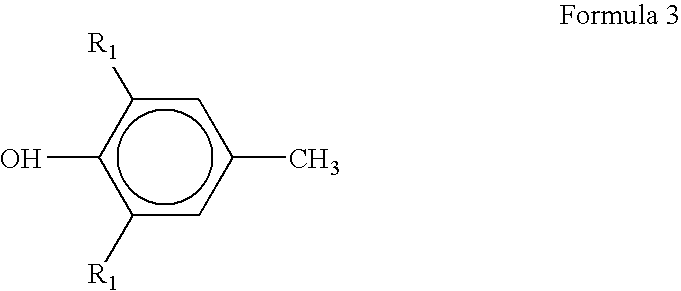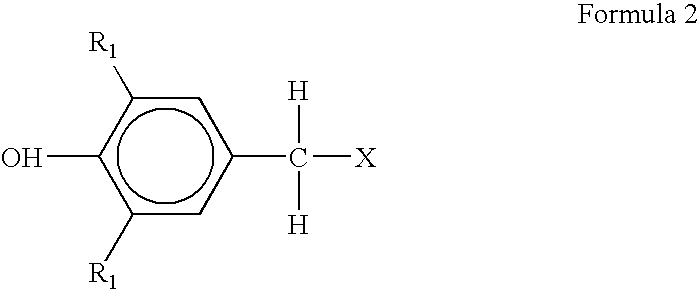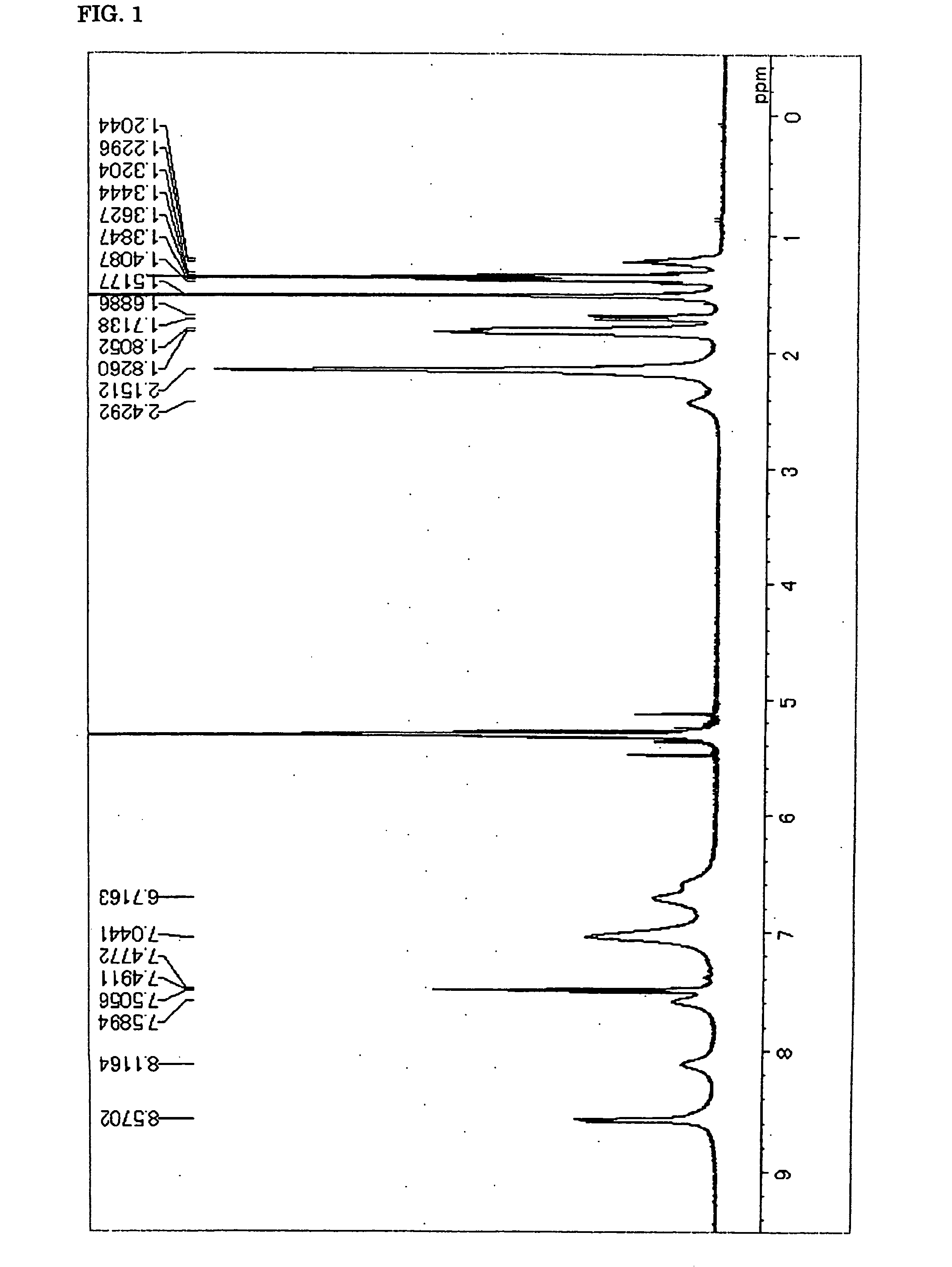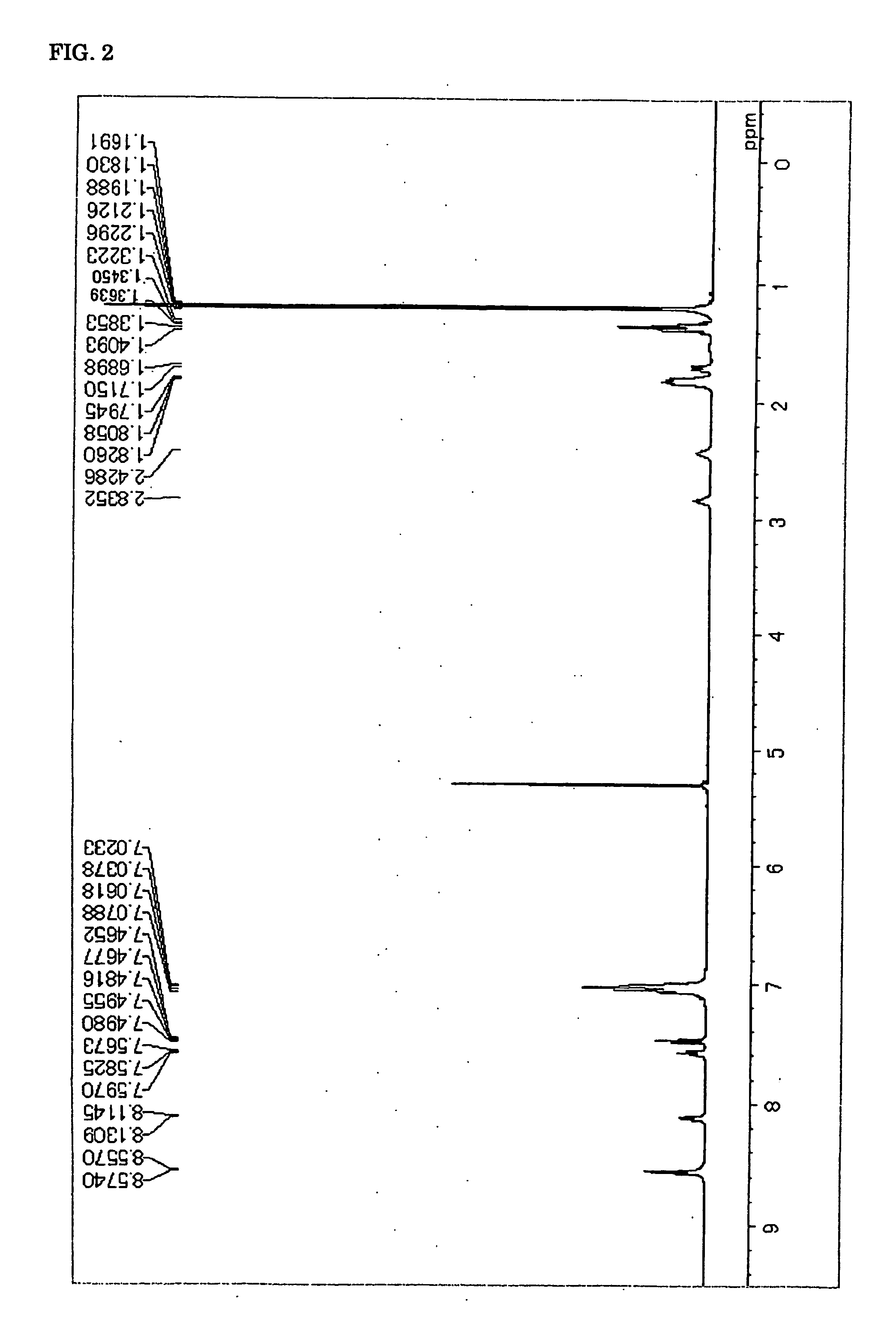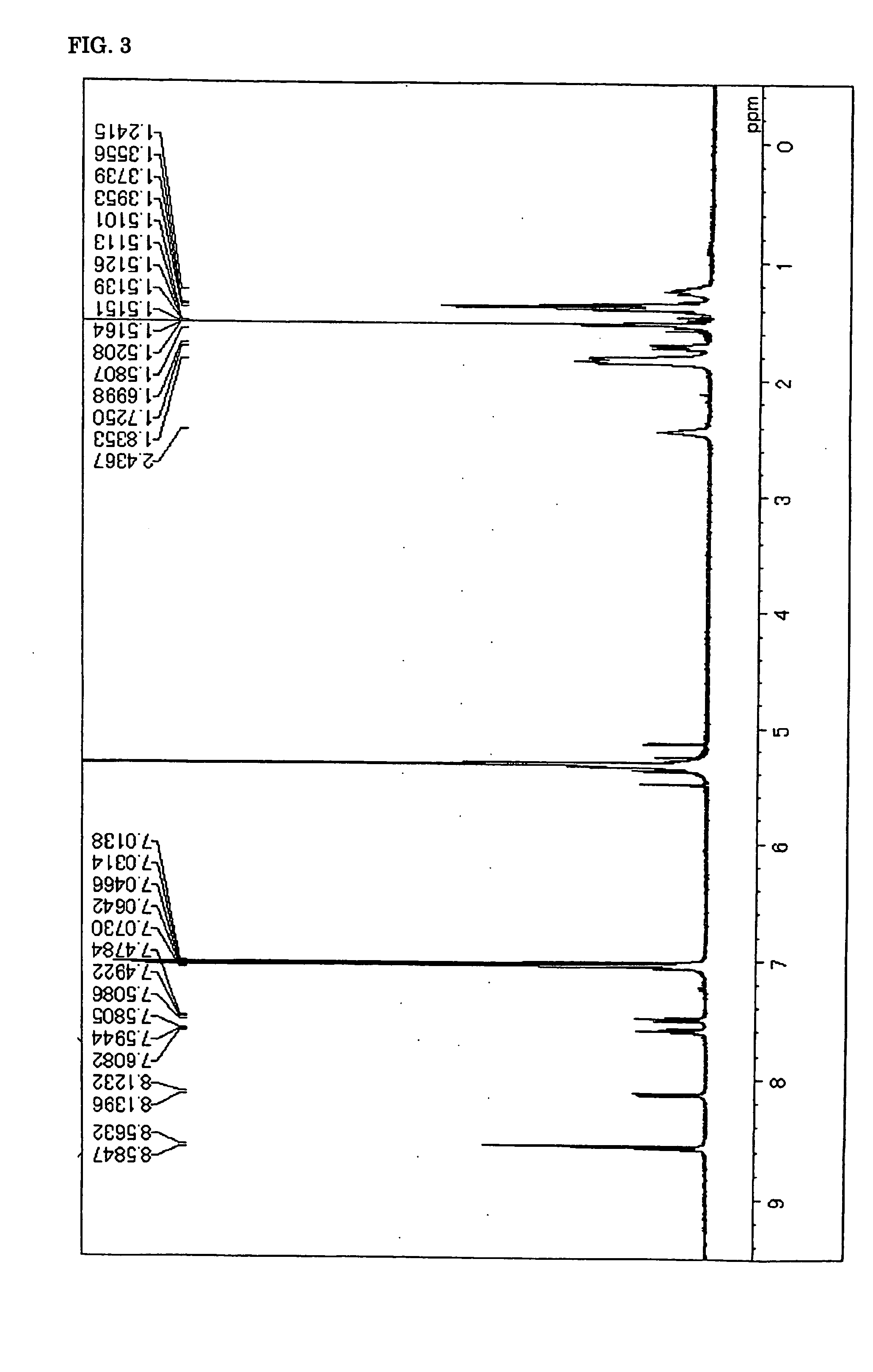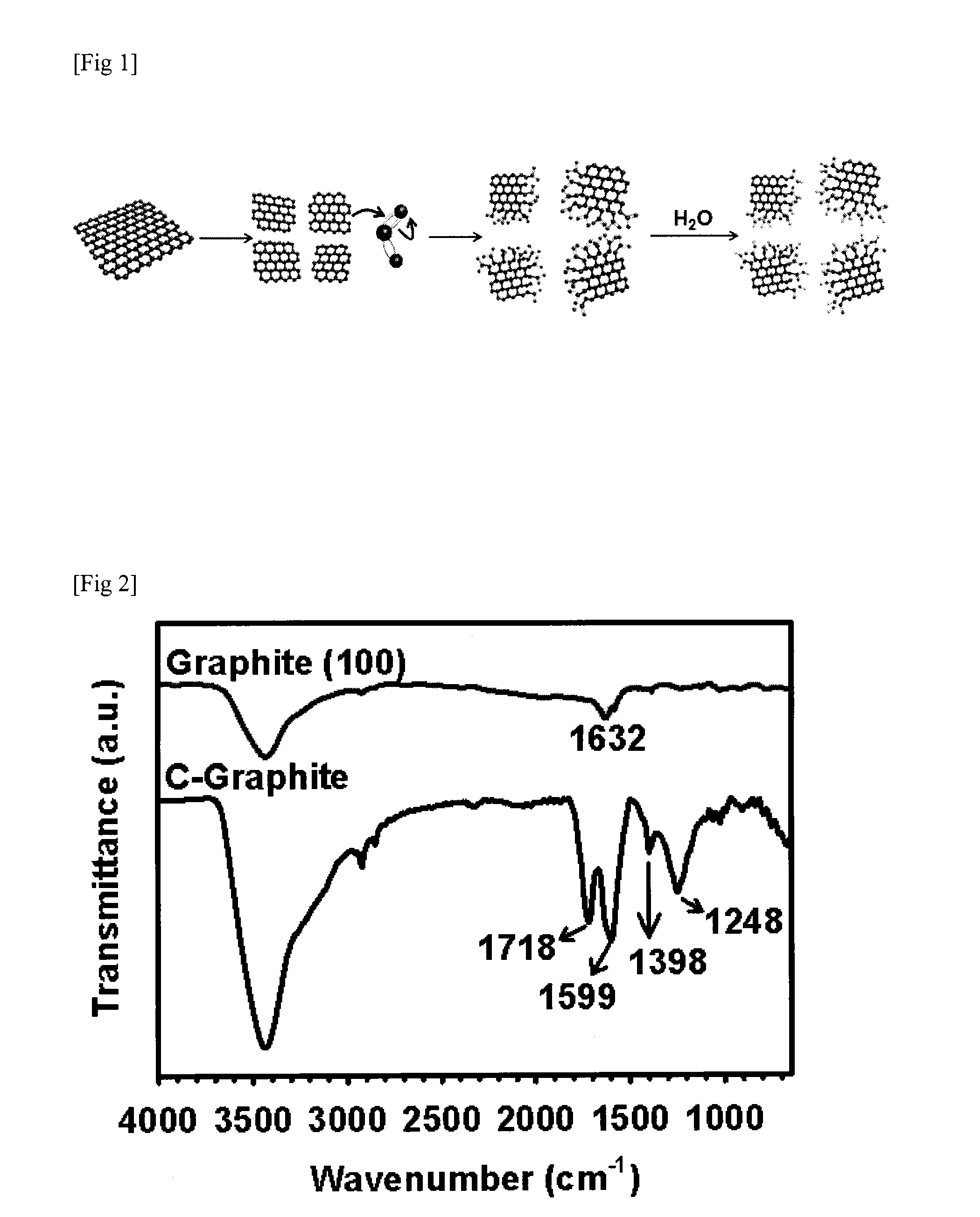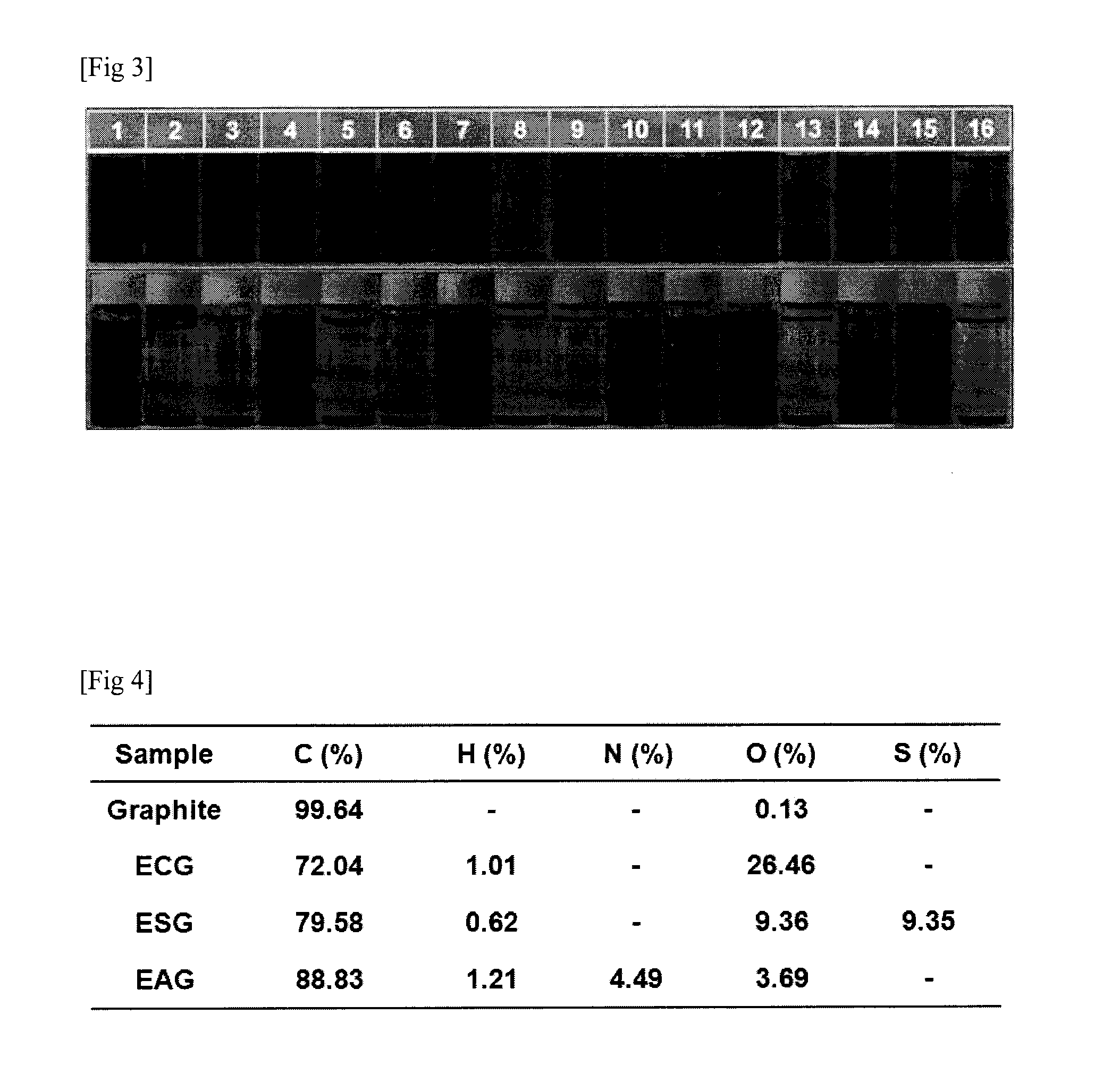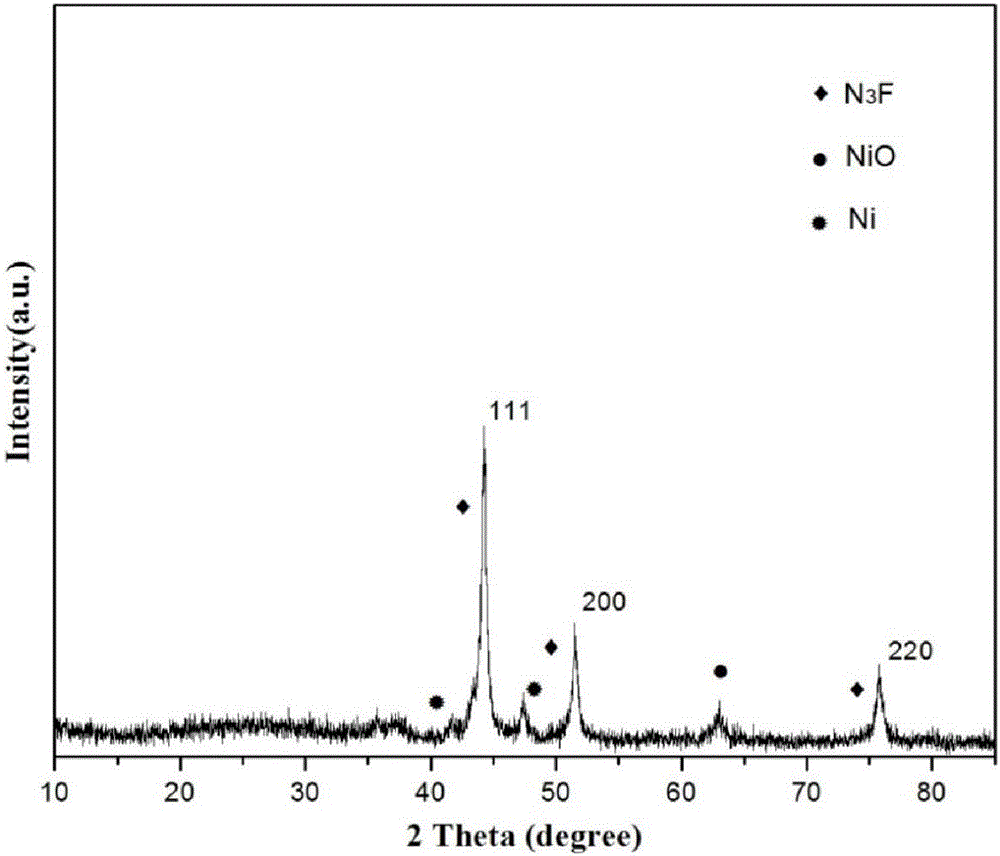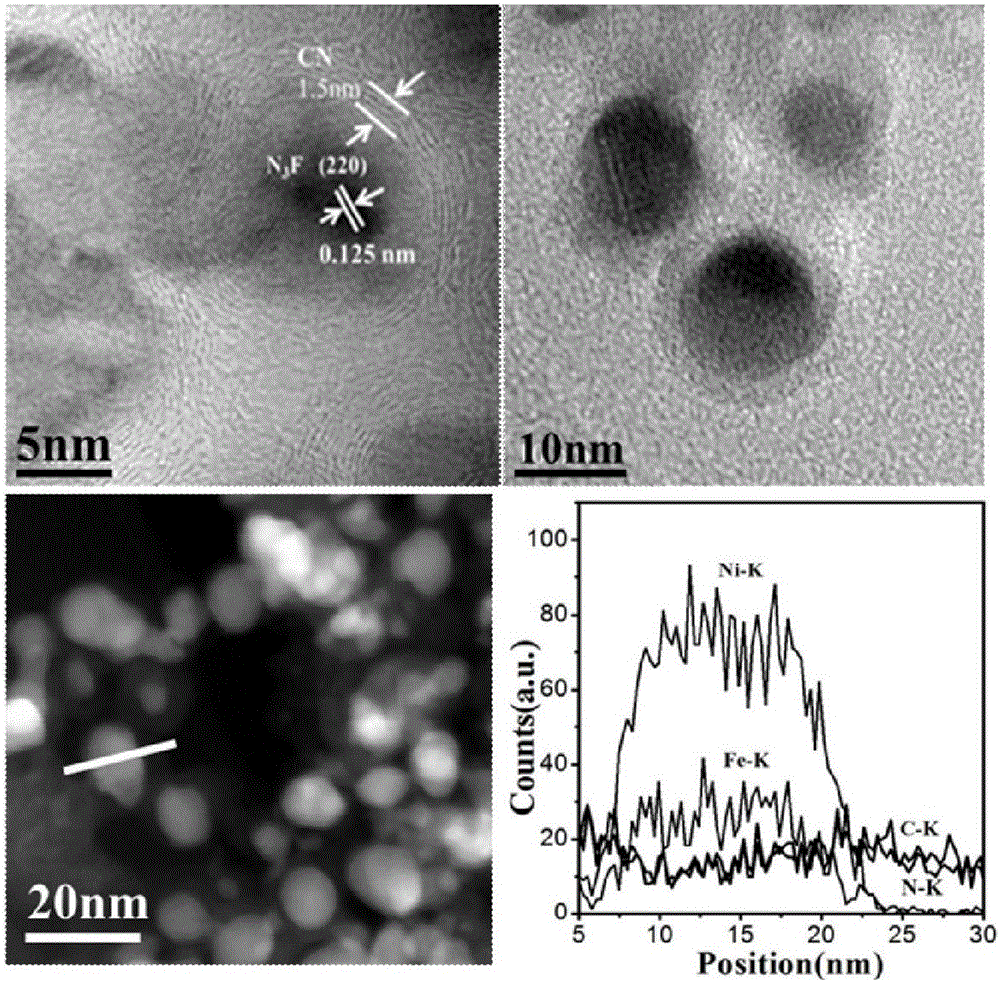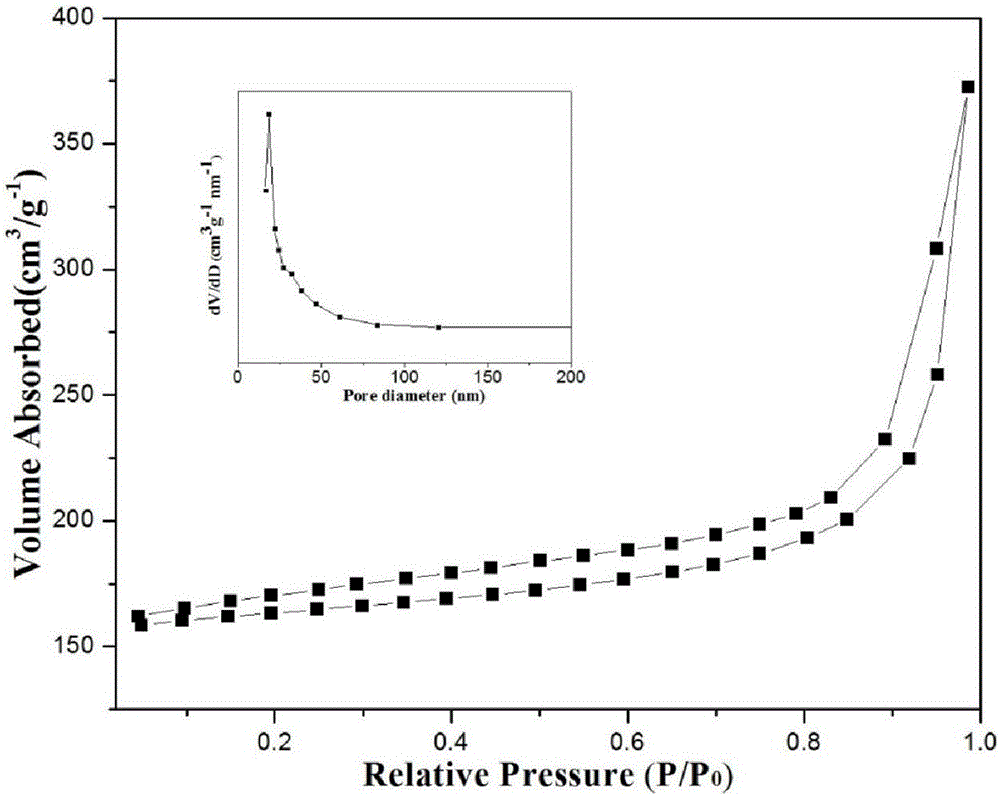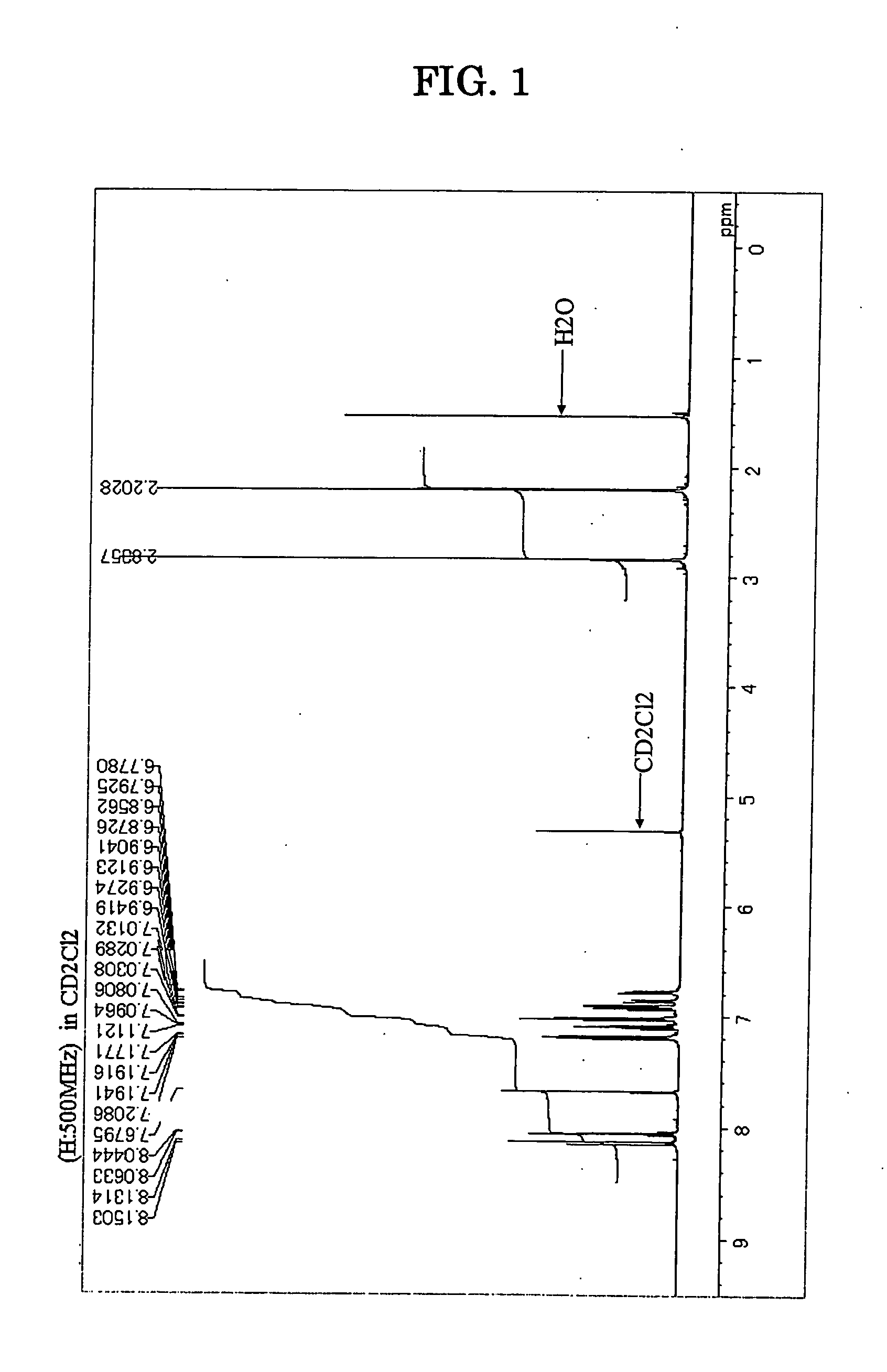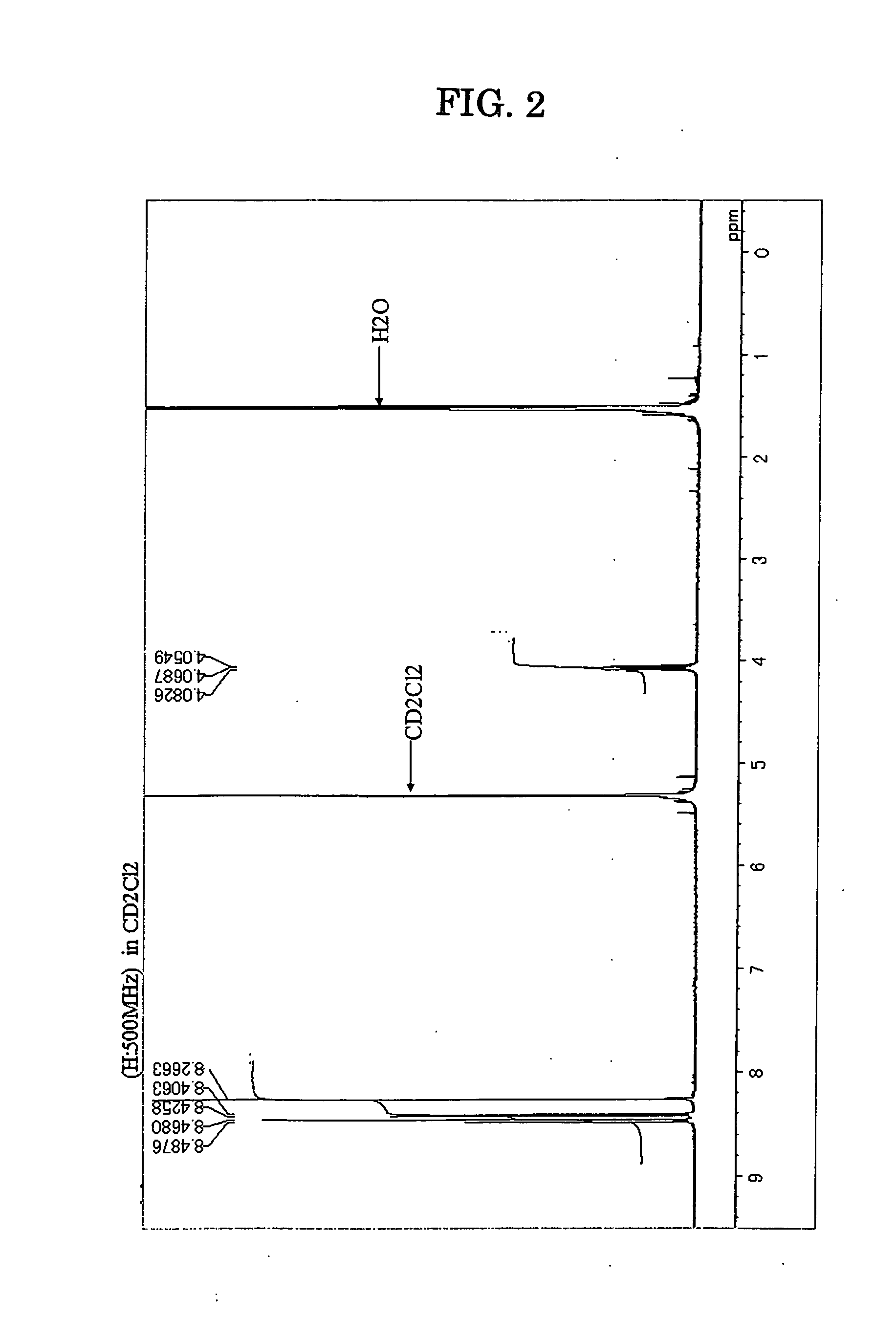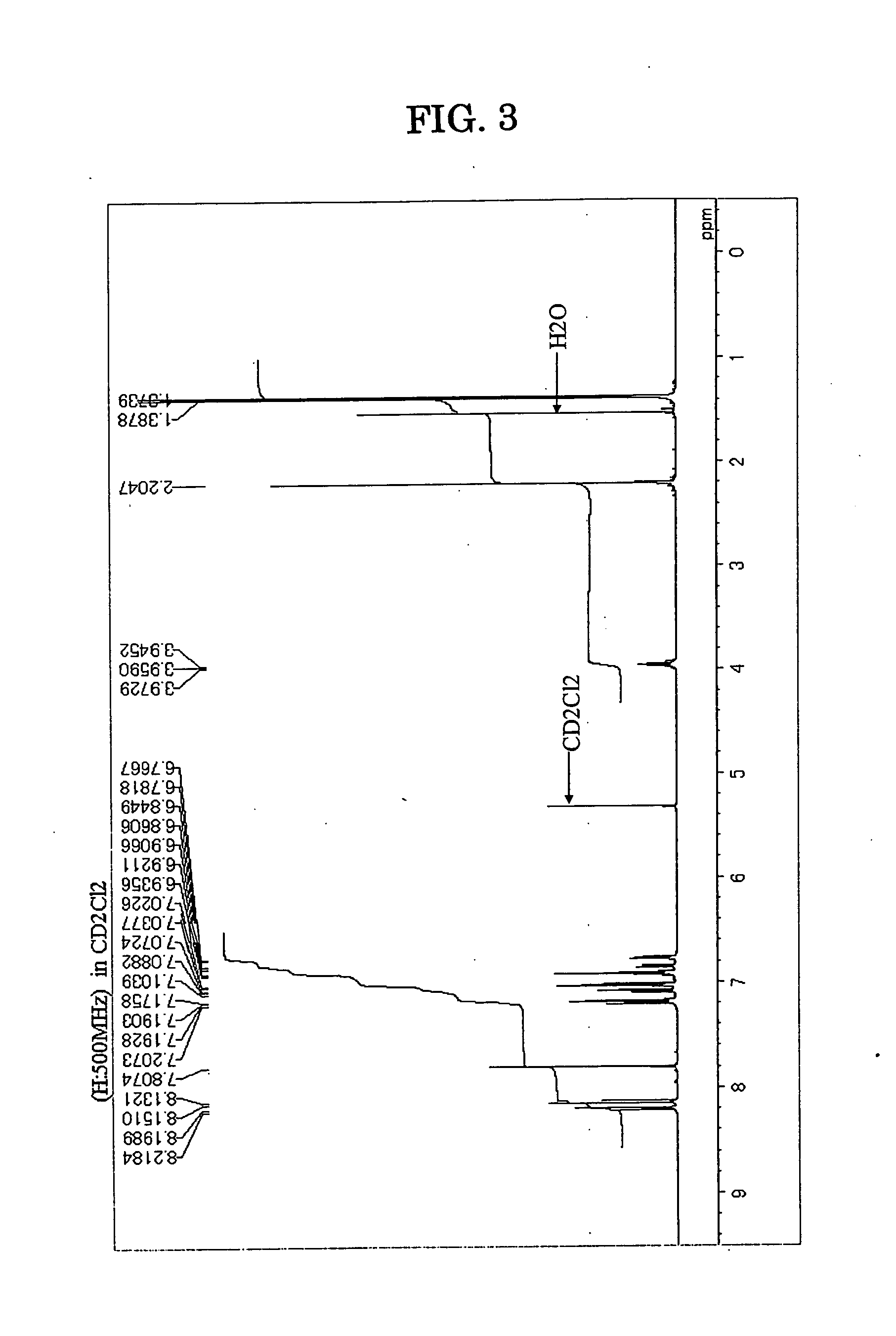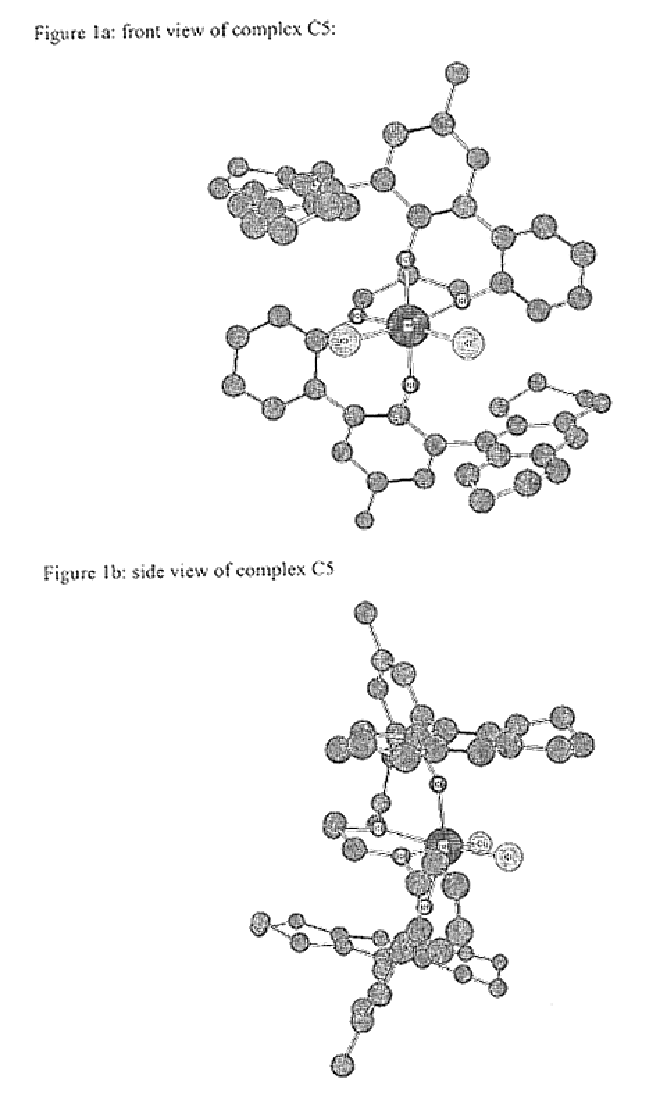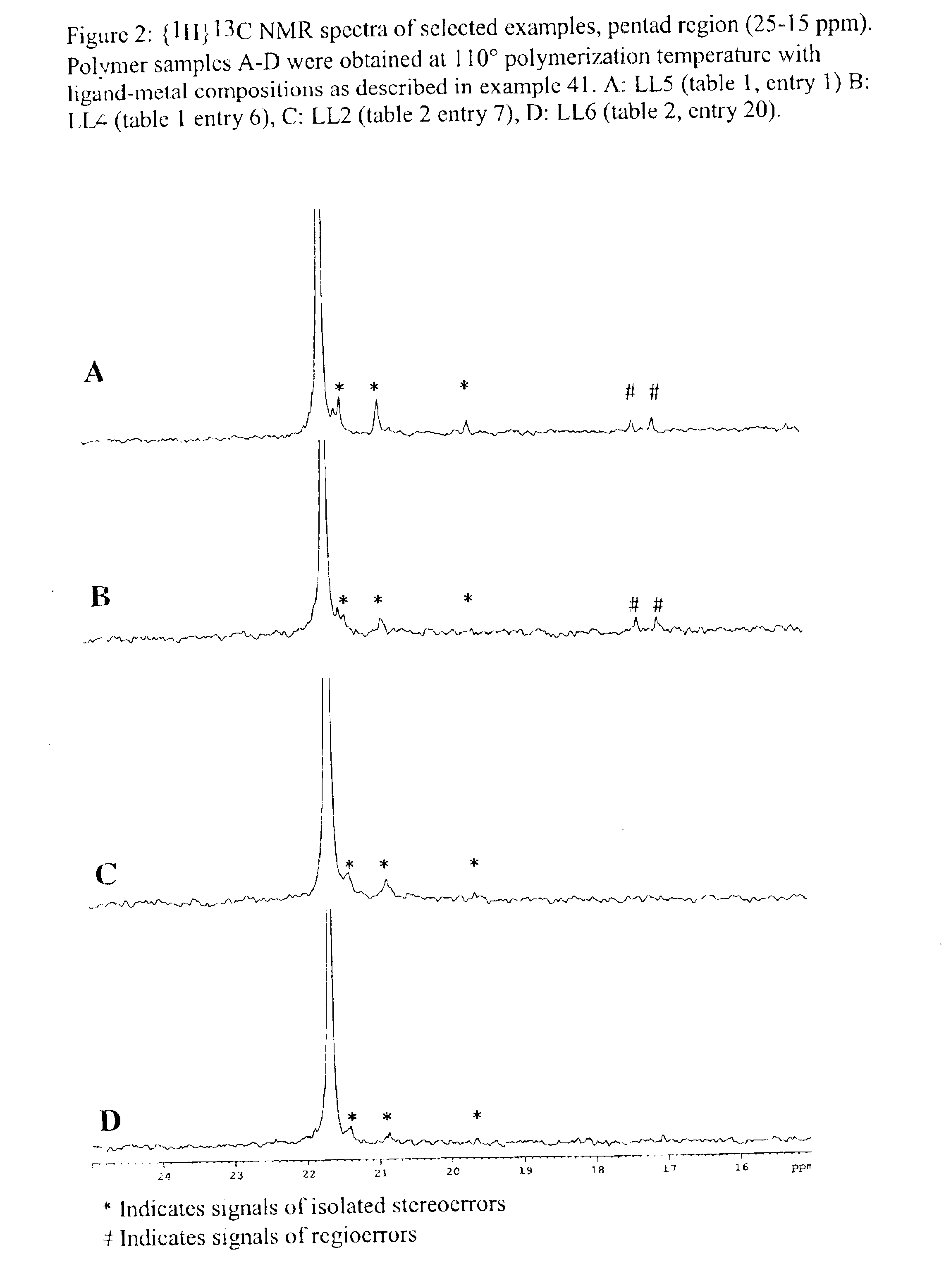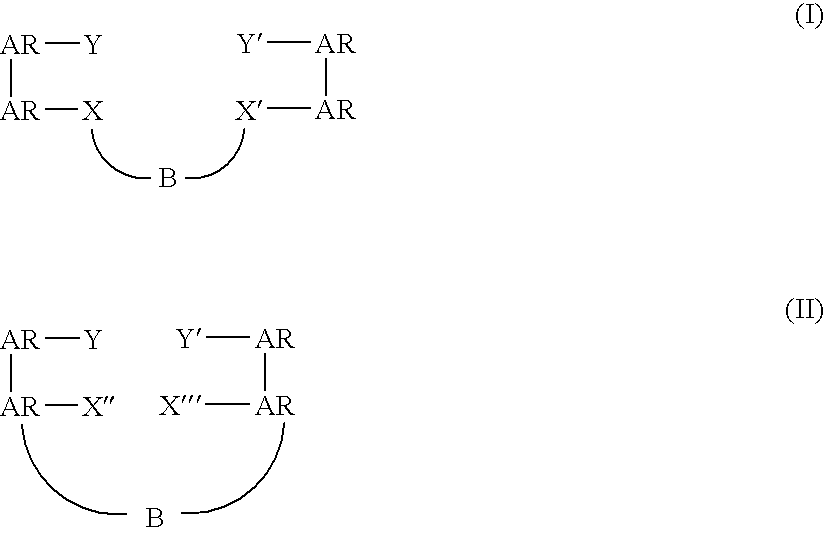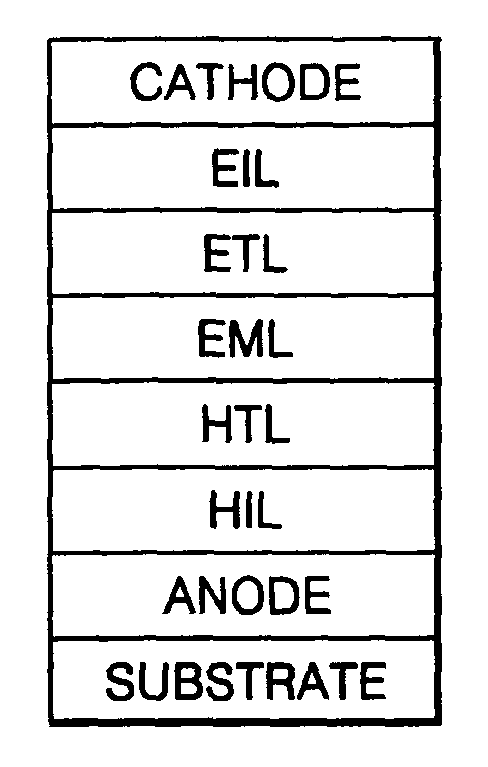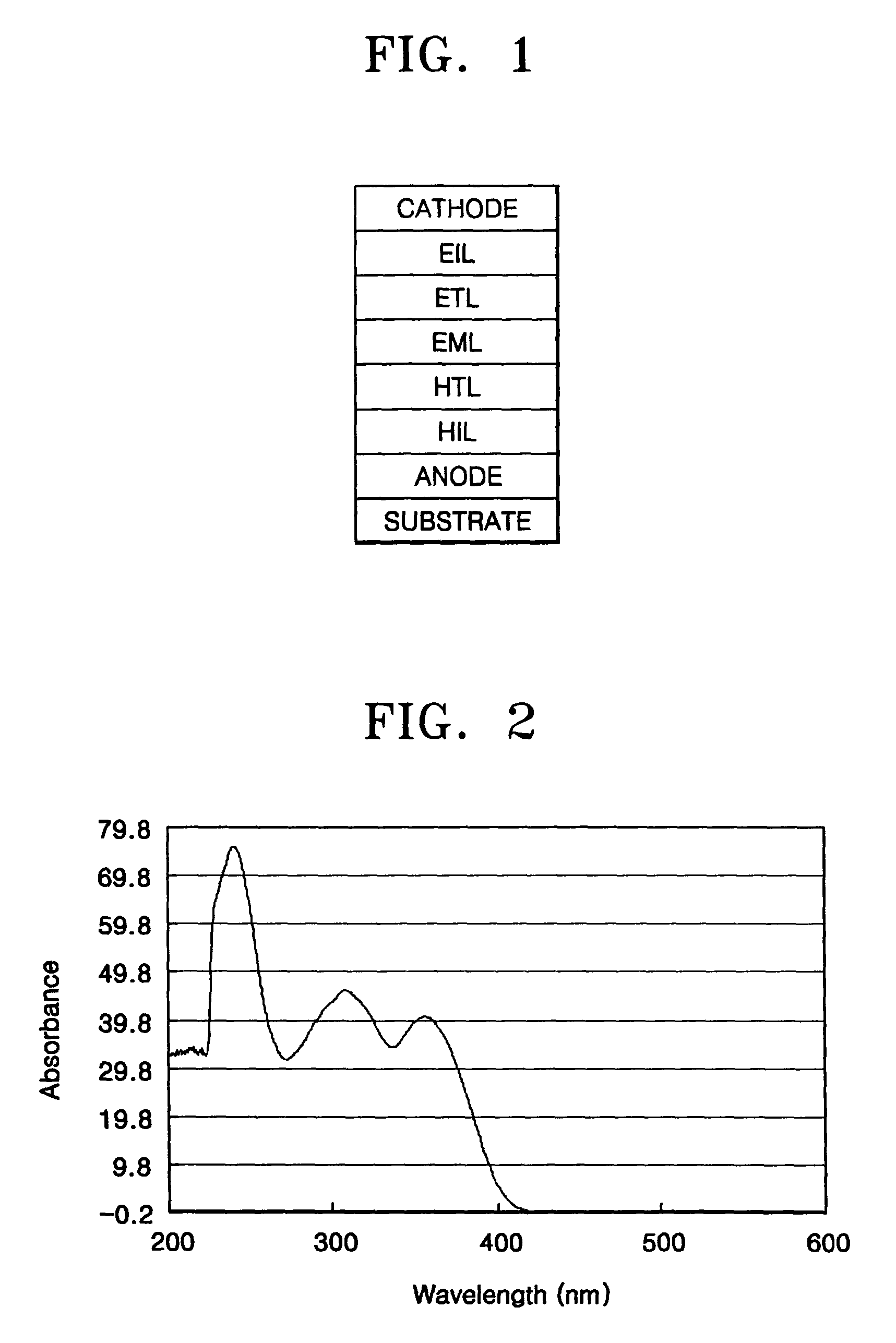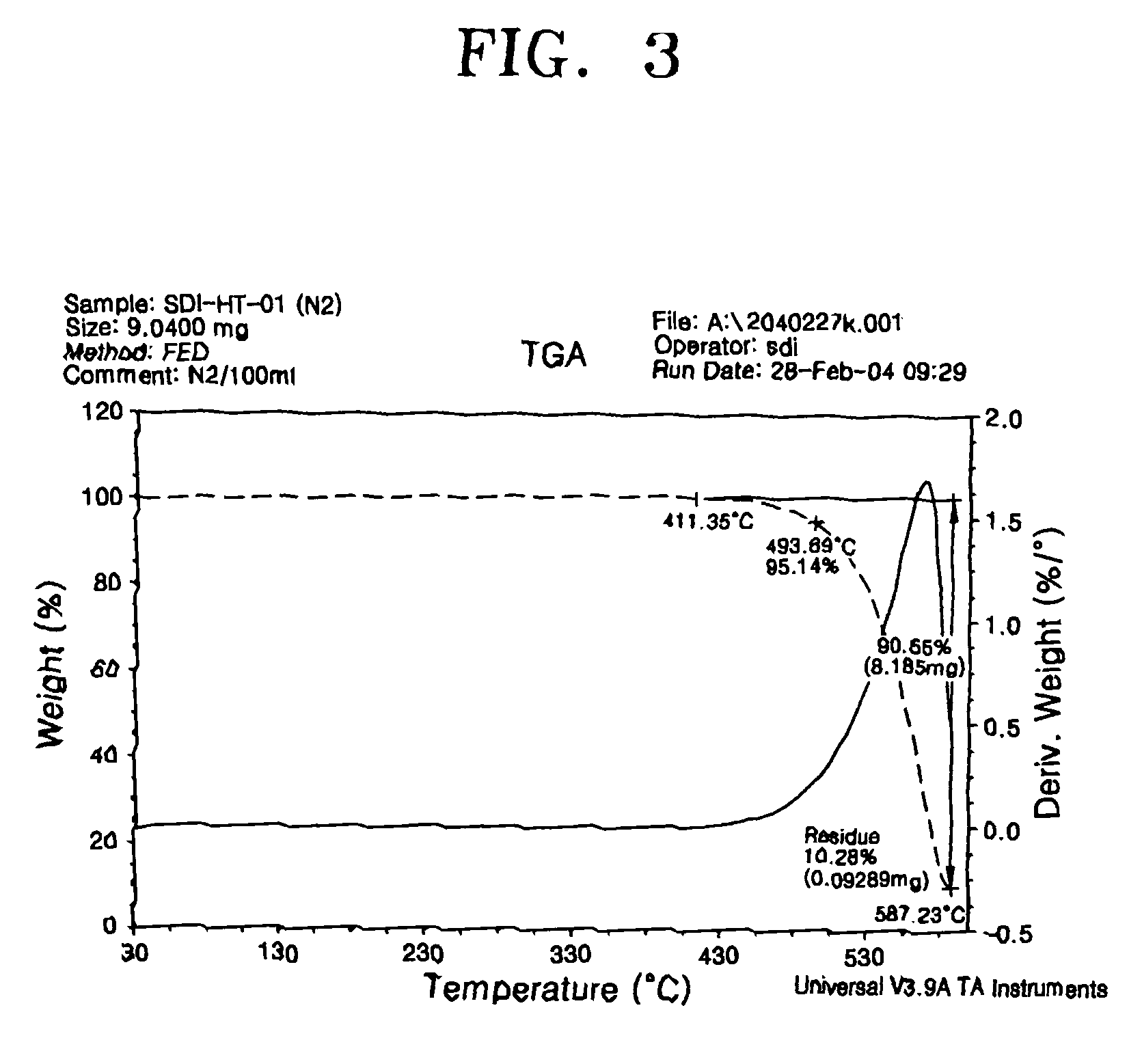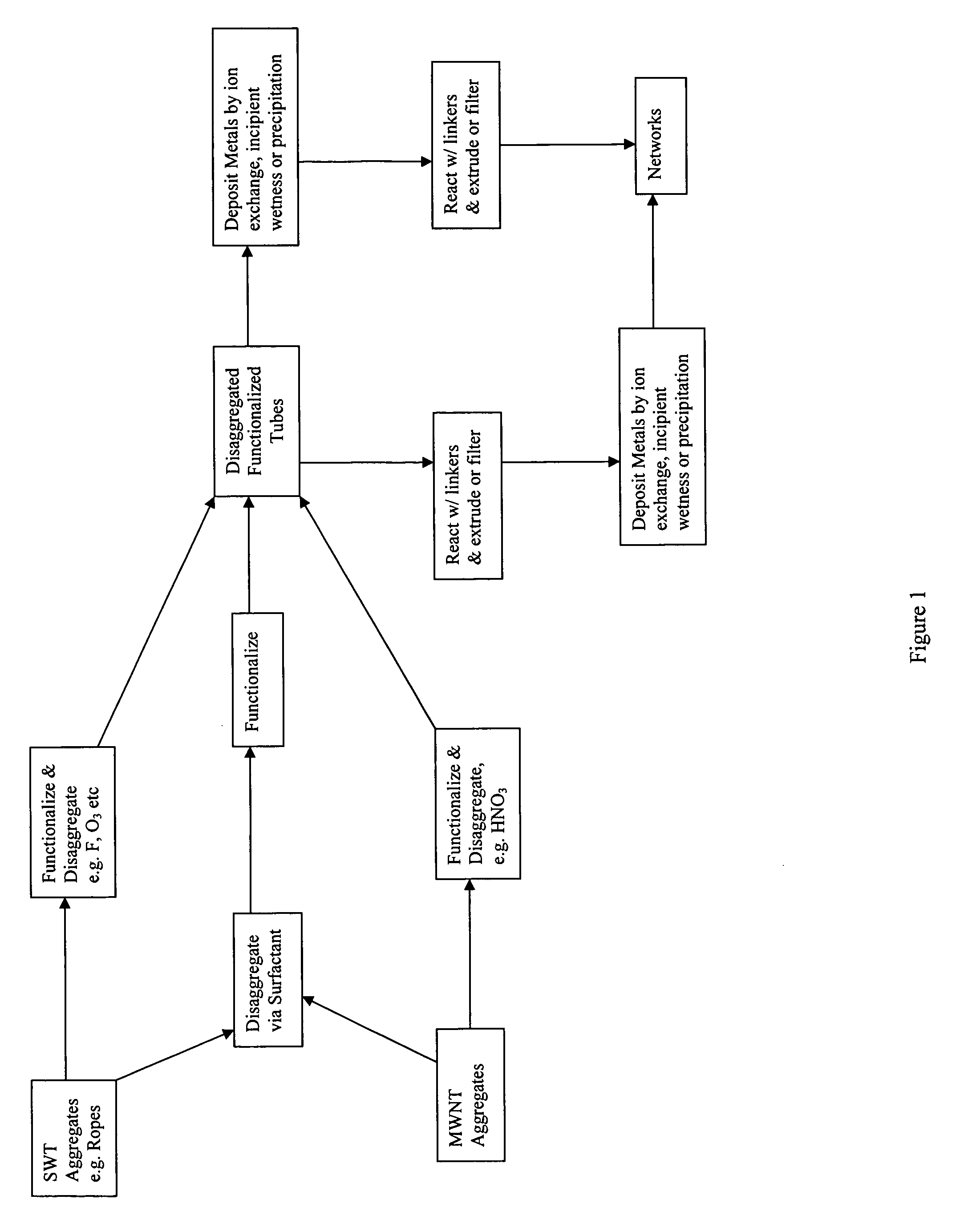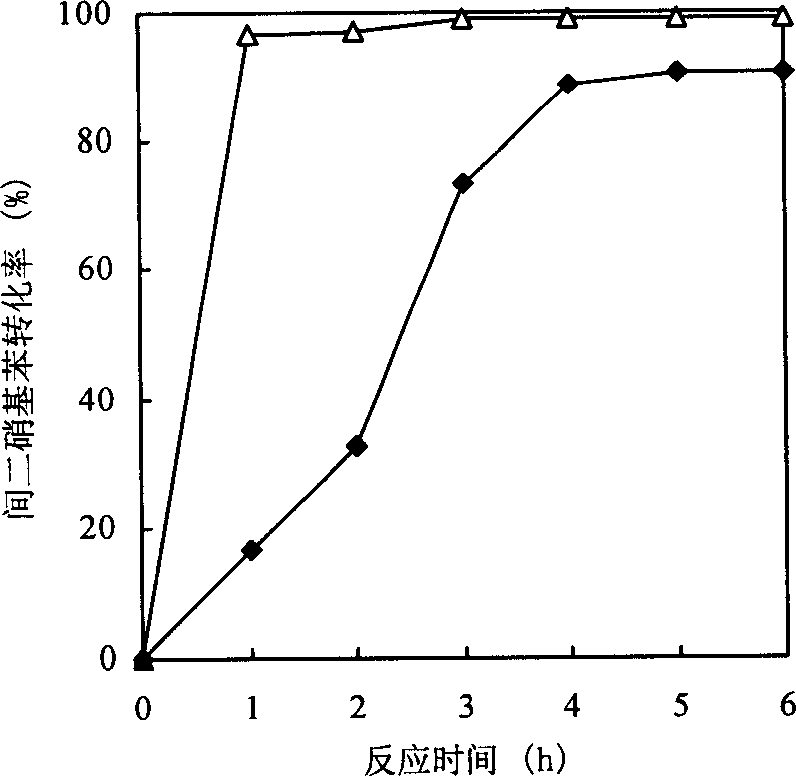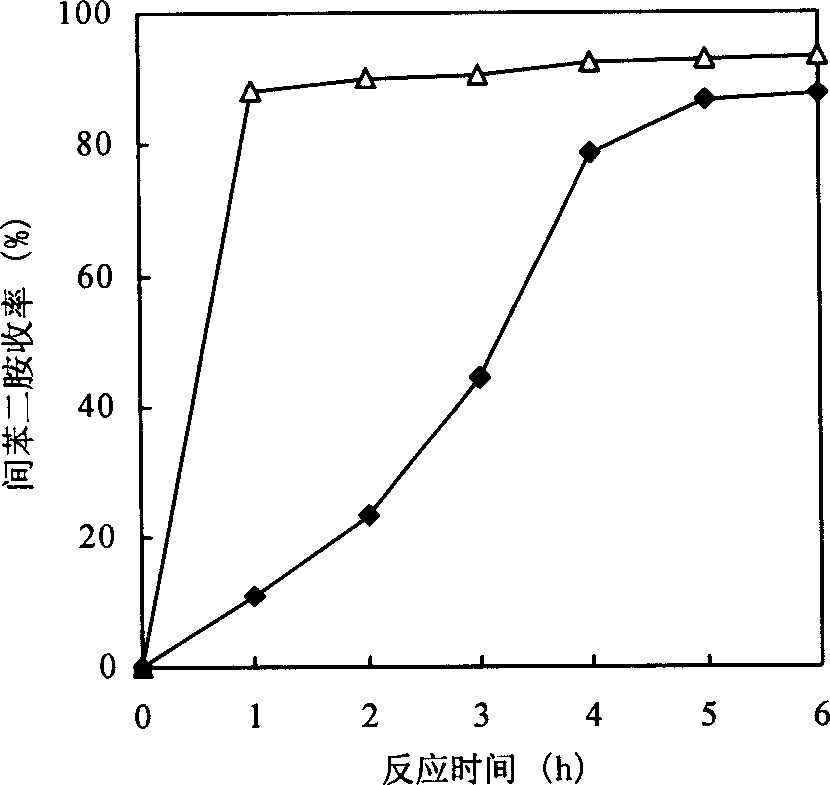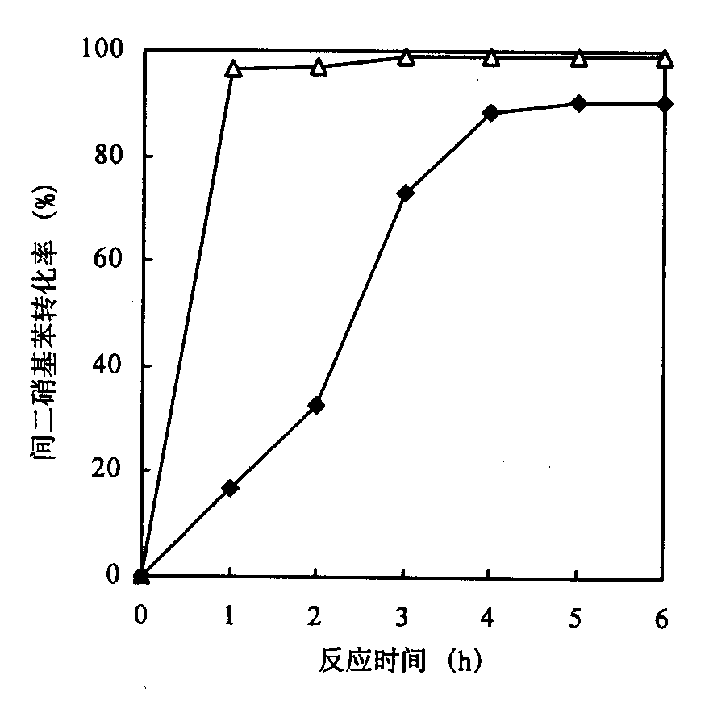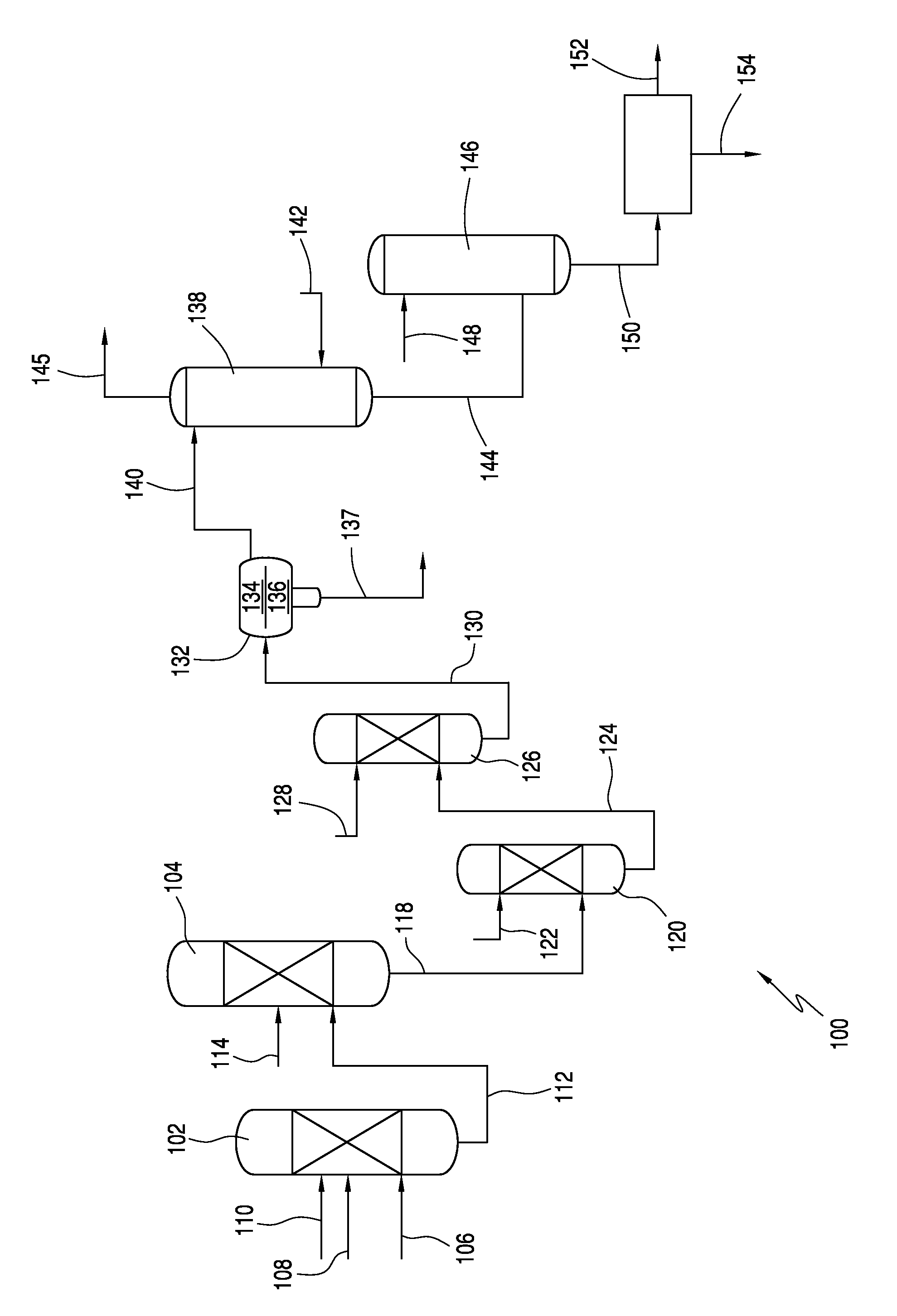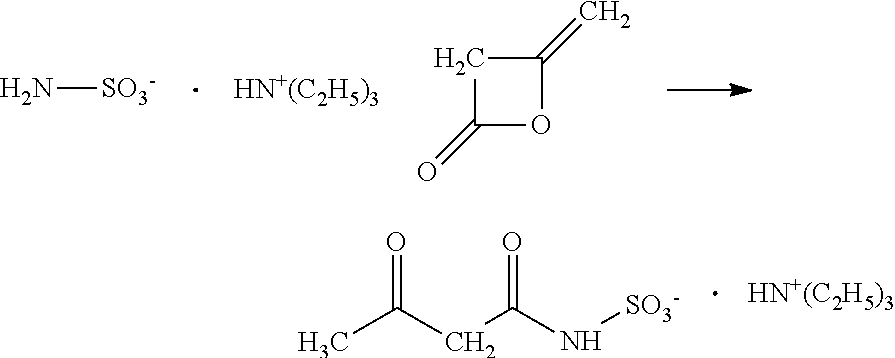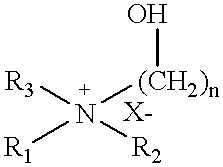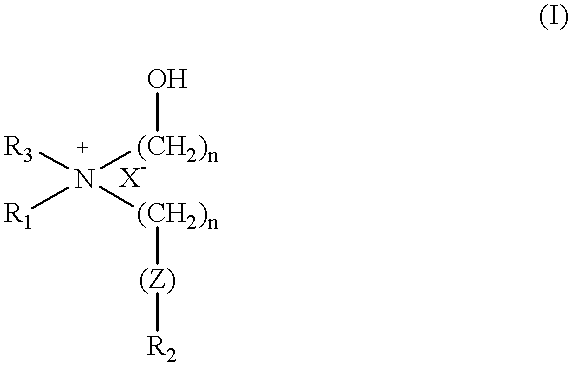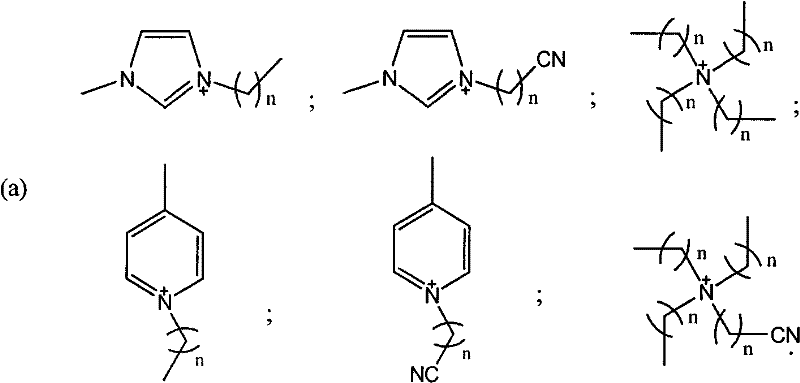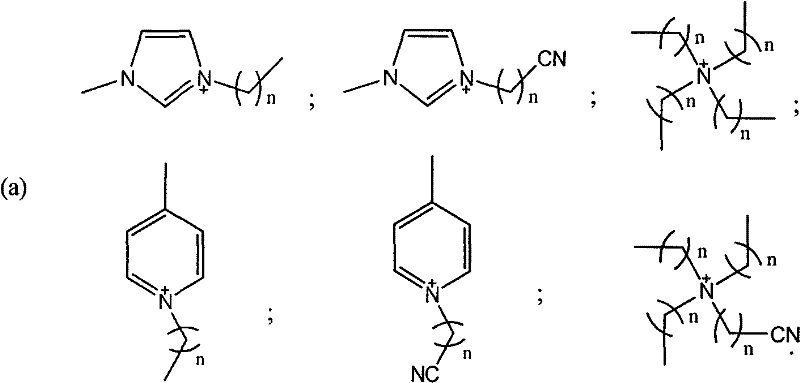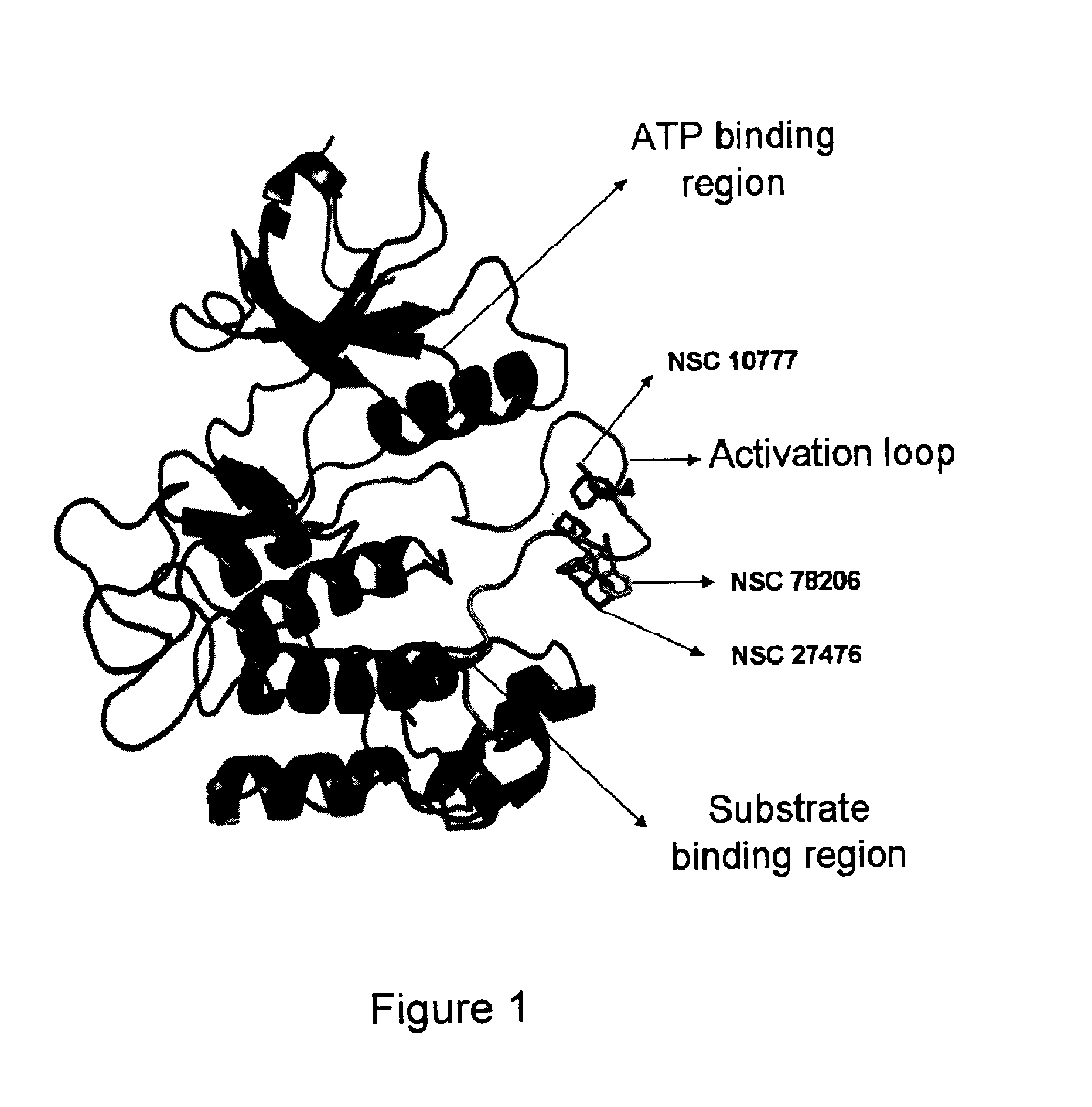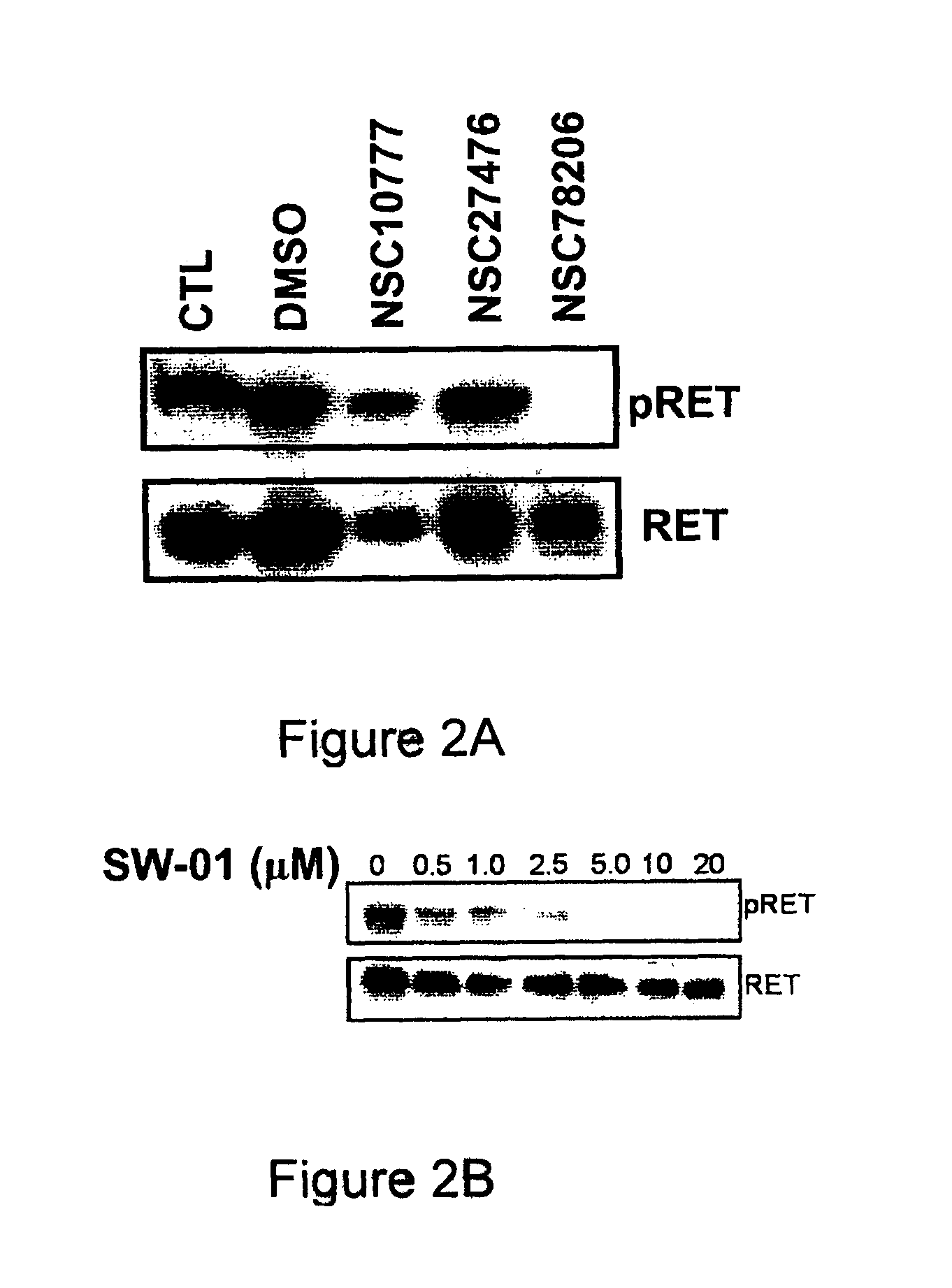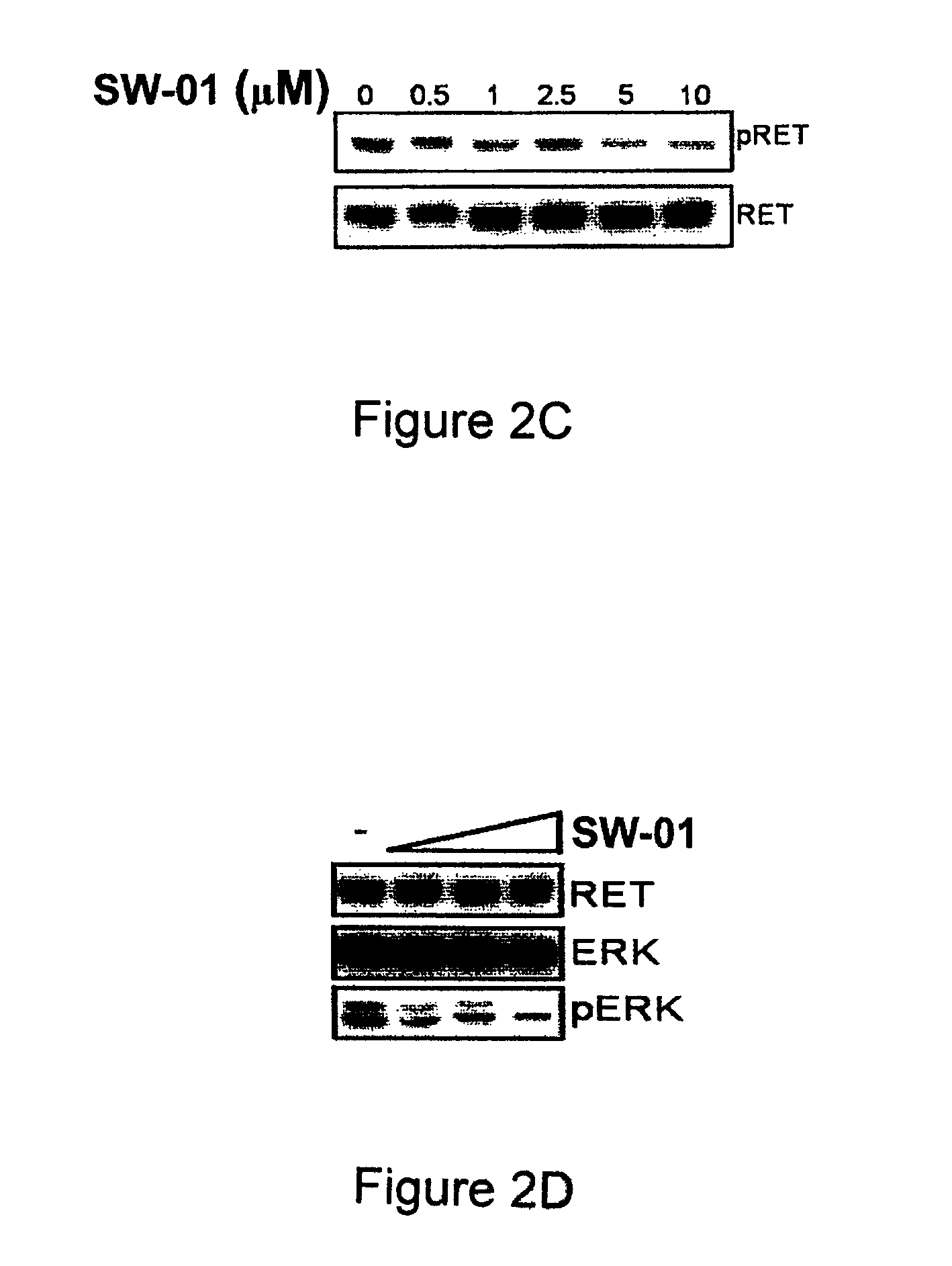Patents
Literature
5898results about "Amino compound preparation" patented technology
Efficacy Topic
Property
Owner
Technical Advancement
Application Domain
Technology Topic
Technology Field Word
Patent Country/Region
Patent Type
Patent Status
Application Year
Inventor
Method for producing aromatic amino compound
InactiveUS7250532B2High yieldEasy to eliminateOrganic compound preparationAmino compound preparationArylCompound a
A method for producing aromatic amino compound (V):by synthesizing intermediate compound (IV):by the reaction of compound (I): H2N—R1 with a mixture of halogenated aryl compounds (II): Ar1—X and (III): Ar2—X in the presence of a noble metal catalyst, followed by eliminating the substituent R1 from the nitrogen atom in compound (IV) under an acidic condition or an alkaline condition or by addition of a reducing agent or an oxidizing agent. (R1: a substituent having 2 to 50 carbon atoms; Ar1 and Ar2: a substituted or unsubstituted hydrocarbon group or heterocyclic group having 6 to 50 carbon atoms and the same with or different from each other; and X: a halogen group). The aromatic amino compound useful as the charge transporting material can be produced efficiently at a great yield without using highly toxic raw materials.
Owner:IDEMITSU KOSAN CO LTD
Porous composite materials having micro and meso/macroporosity
InactiveUS20070087934A1Molecular sieve catalystsOrganic compound preparationMaterials scienceInorganic oxide
A composite material comprises: (a) a porous crystalline inorganic oxide material comprising a first framework structure defining a first set of uniformly distributed pores having an average cross-sectional dimension of from 0.3 to less than 2 nanometers and comprising a second framework structure defining a second set of uniformly distributed pores having an average cross-sectional dimension of from 2 to 200 nanometers and (b) a co-catalyst within the second set of pores of the porous crystalline inorganic oxide material (a).
Owner:EXXONMOBIL CHEM PAT INC
Compound for use in organic electroluminescent device and organic electroluminescent device
Disclosed are an organic electroluminescent device (organic EL device) which is improved in luminous efficiency, fully secured of driving stability, and simple in constitution and a compound for use therein. The organic electroluminescent device comprises a light-emitting layer disposed between an anode and a cathode piled one upon another on a substrate and the light-emitting layer contains a phosphorescent dopant and a compound for use in an organic electroluminescent device having two or more indolocarbazole skeletons as a host material. An example of the compound having indolocarbazole skeletons for use in the device is expressed by the following formula.
Owner:NIPPON STEEL CHEMICAL CO LTD
Compound for Use in Organic Electroluminescent Device and Organic Electroluminescent Device
Disclosed are an organic electroluminescent device (organic EL device) which is improved in luminous efficiency, fully secured of driving stability, and simple in constitution and a compound for use therein. The organic electroluminescent device comprises a light-emitting layer disposed between an anode and a cathode piled one upon another on a substrate and the light-emitting layer contains a phosphorescent dopant and a compound for use in an organic electroluminescent device having two or more indolocarbazole skeletons as a host material. An example of the compound having indolocarbazole skeletons for use in the device is expressed by the following formula.
Owner:NIPPON STEEL CHEMICAL CO LTD
Catalyst for selective hydrogenation reaction of aromatic nitrocompound and preparation method of catalyst
InactiveCN105032424AEasy to storeLow costCarboxylic acid nitrile preparationOrganic compound preparationNitro compoundAlcohol
The invention relates to a catalyst for selective hydrogenation reaction of an aromatic nitrocompound and a preparation method of the catalyst. The catalyst consists of a catalyst carrier and active metal coated with carbon, wherein the catalyst carrier includes a carbon-base carrier, SiO2, TiO2 or Al2O3; the active metal is selected from Co, Fe, Ni or Cu and other poor and noble metals. The catalyst is prepared by adopting a Pechini type sol-gel process which comprises the steps of dispersing an active metal precursor to water containing a coordination compound, adding a polyhydric alcohol solution and a macromolecule auxiliary, then adding the carrier, stirring for dispersion, carrying out hydrothermal reaction, separating out solid on the lower layer, and calcining in the inert atmosphere to obtain the catalyst in which carbon coats the active metal. Compared with the prior art, the catalyst can realize the hydrogenation reaction of a substituted aromatic nitrocompound in the mild condition; substrate conversion rate and production selectivity are high; the catalyst has recyclable economy and good application prospect.
Owner:INST OF CHEM CHINESE ACAD OF SCI
Ligands for metals and improved metal-catalyzed processes based thereon
InactiveUS7223879B2More featureEasy to useCarboxylic acid nitrile preparationCarboxylic acid esters preparationCarbon–carbon bondHeteroatom
One aspect of the present invention relates to ligands for transition metals. A second aspect of the present invention relates to the use of catalysts comprising these ligands in transition metal-catalyzed carbon-heteroatom and carbon-carbon bond-forming reactions. The subject methods provide improvements in many features of the transition metal-catalyzed reactions, including the range of suitable substrates, reaction conditions, and efficiency.
Owner:MASSACHUSETTS INST OF TECH
Cycloalkyl substituted polyamines for cancer therapy and methods of synthesis therefor
Conformationally restricted polyamine compounds useful in treatment of cancer and other diseases marked by abnormal cell proliferation are disclosed. Improved methods of synthesizing such compounds are also disclosed. In one method of the invention, a carbene-bearing or carbene equivalent-bearing compound is reacted with the double bond of an alkene compound to form a cyclopropyl ring as the first step in the synthesis.
Owner:CELLGATE
Production of graphene materials in a cavitating fluid
ActiveUS20150239741A1Shorten the timeReduce lossesCarboxylic acid nitrile preparationGraphiteCavitationLiquid medium
The invention provides a method of producing a graphene material from a starting graphitic material. In an embodiment, the method comprises: (a) dispersing the starting graphitic material in a liquid medium to form a graphite suspension; and (b) introducing the graphite suspension into a hydrodynamic cavitation reactor that generates and collapses cavitation or bubbles in the liquid medium to exfoliate and separate graphene planes from the starting graphitic material for producing the graphene material. The process is fast (minutes as opposed to hours or days of conventional processes), environmentally benign, and highly scalable. The reactor can concurrently perform the functions of graphene production, chemical functionalization, dispersion, and mixing with a polymer to make a composite.
Owner:GLOBAL GRAPHENE GRP INC
Ligands for metals and improved metal-catalyzed processes based thereon
InactiveUS6946560B2More featureEasy to useCarboxylic acid nitrile preparationGroup 5/15 element organic compoundsCarbon–carbon bondHeteroatom
One aspect of the present invention relates to novel ligands for transition metals. A second aspect of the present invention relates to the use of catalysts comprising these ligands in transition metal-catalyzed carbon-heteroatom and carbon-carbon bond-forming reactions. The subject methods provide improvements in many features of the transition metal-catalyzed reactions, including the range of suitable substrates, reaction conditions, and efficiency.
Owner:MASSACHUSETTS INST OF TECH
Production of adipic acid and derivatives from carbohydrate-containing materials
ActiveUS8669397B2Low costLactams preparationCarboxylic acid nitrile preparationCatalytic oxidationHydrodeoxygenation
The present invention generally relates to processes for the chemocatalytic conversion of a glucose source to an adipic acid product. The present invention includes processes for the conversion of glucose to an adipic acid product via glucaric acid or derivatives thereof. The present invention also includes processes comprising catalytic oxidation of glucose to glucaric acid or derivative thereof and processes comprising the catalytic hydrodeoxygenation of glucaric acid or derivatives thereof to an adipic acid product. The present invention also includes products produced from adipic acid product and processes for the production thereof from such adipic acid product.
Owner:ARCHER DANIELS MIDLAND CO
Advanced catalysts for fine chemical and pharmaceutical applications
A catalyst comprising a plurality of support nanoparticles and a plurality of catalytic nanoparticles. At least one catalytic nanoparticle is bonded to each support nanoparticle. The catalytic particles have a size and a concentration, wherein a first configuration of the size and the concentration of the catalytic nanoparticles enables a first catalysis result and a second configuration of the size and the concentration of the catalytic nanoparticles enables a second catalysis result, with the first and second configurations having a different size or concentration, and the first and second catalysis results being different. In some embodiments, the first catalysis result is a selective reduction of a first selected functional group without reducing one or more other functional groups, and the second catalysis result is a selective reduction of a second selected functional group without reducing one or more other functional groups.
Owner:SDC MATERIALS
Phenylcarbazole-based compound and organic electroluminescent device employing the same
ActiveUS20060115680A1High glass transition temperaturePrevent crystallizationDischarge tube luminescnet screensOrganic compound preparationElectricityCarbazole
A phenylcarbazole-based compound is represented by Formula 1, and has superior electric properties and charge transport abilities, and thus is useful as a hole injection material, a hole transport material, and / or an emitting material which is suitable for fluorescent and phosphorescent devices of all colors, including red, green, blue, and white colors. The phenylcarbazole-based compound is synthesized by reacting carbazole with diamine. The organic electroluminescent device manufactured using the phenylcarbazole-based compound has high efficiency, low voltage, high luminance, and a long lifespan.
Owner:SAMSUNG DISPLAY CO LTD
Method for preparing supported catalysts from metal loaded carbon nanotubes
InactiveUS20060142149A1Improves Structural IntegrityMaterial nanotechnologyOrganic compound preparationPtru catalystNanotube
A new method for preparing a supported catalyst is herein provided. Carbon nanotubes are functionalized by contacting them with an oxidizing agent to form functionalized carbon nanotubes. A metal catalyst is then loaded or deposited onto the functionalized carbon nanotubes. The mixture is then extruded to form the supported catalyst comprising a carbon nanotube structure containing metal catalyst more evenly dispersed within the internal structure of the carbon nanotube structure.
Owner:HYPERION CATALYSIS INT
Antiozonant cum antioxidant, process for preparation
InactiveUS6770785B1Organic compound preparationAmino compound preparationOrganic solventSolvent evaporation
The present invention relates to a novel antiozonant as well as antioxidant based on functionalized hindered phenol and the process for the preparation thereof of formula 1wherein R1 is tert-butyl and R2 and R3 are C1 to C8 linear or branched alkyl. The present invention also relates to a process for the preparation thereof comprising dissolving a compound of formula 3wherein R1 is tert-butyl, with liquid bromine in a non polar organic solvent at temperature range 80 to 95° C. for a period of 4 to 7 hours, evaporating the solvent under reduced pressure to obtain a compound of formula 2wherein R1 is a tertiary butyl group and X is Br, reacting the compound of formula 2 with a compound of formula 4wherein R2 and R3 are C1 to C8 linear or branched alkyl, dissolved in an organic solvent in presence of a suitable mild base at a temperature ranging from 80 to 95° C. for a period of 4 to 7 hours, bringing the reaction mixture to room temperature, separating the organic layer and concentrating the product by solvent evaporation under reduced pressure and purifying the final product by column chromatography to obtain compound of formula 1.
Owner:COUNCIL OF SCI & IND RESEARACH
Aromatic amine derivative and organic electroluminescence device using the same
ActiveUS20060194074A1High purityLong lastingDischarge tube luminescnet screensOrganic compound preparationOrganic electroluminescenceLight emission
An aromatic amine derivative with a specified structure whose benzene ring is bonded with a cycloalkyl group. An organic electroluminescence device which comprises at least one organic thin film layer comprising a light emitting layer sandwiched between a pair of electrode consisting of an anode and a cathode, wherein at least one of the organic thin film layer comprises the aromatic amine derivative singly or in combination. The organic EL device employing the aromatic amine derivative reveals practically sufficient luminance even under low applied voltage, exhibits an enhanced efficiency of light emission, and is resistant to degrade even after a long time usage demonstrating a prolonged lifetime.
Owner:IDEMITSU KOSAN CO LTD
Edge-functionalized graphitic material through mechanochemical process and manufacturing method thereof
InactiveUS20130018204A1High degree of commercializationRaise the potentialMaterial nanotechnologyOrganic compound preparationGas phaseMaterials science
Disclosed is an edge-functionalized graphitic material manufactured by using a mechanochemical process. The edge-functionalized graphitic material is manufactured by pulverizing graphite in the presence of a variety of atmospheric agents in the form of gas phase, liquid phase, or solid phase. The edge-functionalized graphitic material, which is a precursor applicable into various fields, is expected to replace the prior art oxidized graphite.
Owner:DEOKYANG ECO LTD
Preparation of nitrogen doped carbon-encapsulated core-shell structure ferro-nickel nano-catalyst and application thereof in catalyzing o-chloronitrobenzene hydrogenation reaction
ActiveCN106732733AMaterial nanotechnologyPhysical/chemical process catalystsNano catalystNitro compound
The invention provides a preparation method of a nitrogen doped carbon-encapsulated core-shell structure ferro-nickel nano-catalyst and the application of the nitrogen doped carbon-encapsulated core-shell structure ferro-nickel nano-catalyst in catalyzing an o-chloronitrobenzene hydrogenation reaction. According to the method, the novel nitrogen doped carbon-encapsulated core-shell structure ferro-nickel nano-catalyst is prepared by synthesizing a ferronickel layered doubled hydroxide precursor with small grain size and high surface energy through a nucleation crystallization isolation method, evenly mixing the ferronickel layered doubled hydroxide precursor with a melamine and dicyandiamide mixed carbon material precursor, and finally self-reducing at high temperature. The nitrogen doped carbon-encapsulated core-shell structure ferro-nickel nano-catalyst is efficiently applied to the reaction where halogenated aniline is generated through catalytic hydrogenation of a nitro-halogen compound, and the conversion rate of o-chloronitrobenzene and the selectivity of o-chloroaniline are respectively up to 95-100% and 98-100%. The structure of the novel nitrogen doped carbon-encapsulated core-shell structure ferro-nickel nano-catalyst is unique and novel, the process is green and energy-saving, the structure of the catalyst is stable, and the catalyst has a broad application prospect.
Owner:BEIJING UNIV OF CHEM TECH
Aromatic Amine Derivative, Organic Electroluminescent Element Employing the Same, and Process for Producing Aromatic Amine Derivative
ActiveUS20070252511A1Extended service lifeImprove efficiencyDischarge tube luminescnet screensCarboxylic acid nitrile preparationOrganic electroluminescenceLight emission
An aromatic amine derivative with a special structure obtained by bonding a diphenylamino group having a substituent to a substituted pyrene structure; and a process for producing the aromatic amine derivative. An organic electroluminescence device which comprises at least one organic thin film layer comprising a light emitting layer sandwiched between a pair of electrodes consisting of an anode and a cathode, wherein at least one of the organic thin film layer comprises the aromatic amine derivative singly or as its mixture component. An organic electroluminescence device having a prolonged lifetime and emits blue light with an enhanced efficiency of light emission and an aromatic amine derivative realizing the device are provided.
Owner:IDEMITSU KOSAN CO LTD
Bridged bi-aromatic ligands, catalysts, processes for polymerizing and polymers therefrom
InactiveUS6841502B2Improve catalytic performanceOrganic compound preparationGroup 4/14 organic compounds without C-metal linkages1-OcteneAlkene
New ligands and compositions with bridged bis-aromatic ligands are disclosed that catalyze the polymerization of monomers into polymers. These catalysts with metal centers have high performance characteristics, including higher comonomer incorporation into ethylene / olefin copolymers, where such olefins are for example, 1-octene, propylene or styrene. The catalysts also polymerize propylene into isotactic polypropylene.
Owner:DOW GLOBAL TECH LLC
Phenylcarbazole-based compound and organic electroluminescent device employing the same
ActiveUS8021764B2High glass transition temperatureElectric stabilityDischarge tube luminescnet screensOrganic compound preparationCarbazoleLow voltage
A phenylcarbazole-based compound is represented by Formula 1, and has superior electric properties and charge transport abilities, and thus is useful as a hole injection material, a hole transport material, and / or an emitting material which is suitable for fluorescent and phosphorescent devices of all colors, including red, green, blue, and white colors. The phenylcarbazole-based compound is synthesized by reacting carbazole with diamine. The organic electroluminescent device manufactured using the phenylcarbazole-based compound has high efficiency, low voltage, high luminance, and a long lifespan.
Owner:SAMSUNG DISPLAY CO LTD
Metal catalysts
InactiveUS6747180B2Low bulk densityHigh activityOrganic compound preparationCatalyst activation/preparationHydration reactionAlkyl transfer
Owner:DEGUSSA AG +1
Methods for preparing catalysts supported on carbon nanotube networks
InactiveUS20060142148A1Material nanotechnologyOrganic compound preparationMetal catalystCarbon nanotube
A new method for preparing a supported catalyst is herein provided. The supported catalyst comprises a carbon nanotube network structure containing metal catalysts. The metal catalyst may be loaded onto functionalized carbon nanotubes before forming the carbon nanotube network structure. Alternatively, the metal catalyst may be loaded onto the carbon nanotube network structures themselves.
Owner:HYPERION CATALYSIS INT
Preparation of amines
InactiveUS6140539ASimplifies work-upIncreased space-time yieldOrganic compound preparationOrganic chemistry methodsHydrogenMetal
In a process for preparing amines, in which at least one compound containing at least one nitro group is reacted with hydrogen in the presence of a supported catalyst comprising, as catalytically active metal, nickel, if desired together with at least one metal of transition group I, V, VI and / or VIII, the reduced and stabilized supported catalyst comprises nickel crystallites having a bimodal nickel crystallite size distribution having maxima at 30-80 Angstr+E,uml o+EE m and 81-150 Angstr+E,uml o+EE m on a support comprising ZrO2, ZrO2-HfO2 and / or SiO2-ZrO2 and / or SiO2-ZrO2-HfO2 and in the reduced and passivated state has a nickel content of 60-80 percent by mass, an SiO2 content of 0-20 percent by mass, a ZrO2 content of 0-40 percent by mass, an HfO2 content of 0-4 percent by mass and after further reduction for one hour at 100 DEG C. has a degree of reduction of at least 70%.
Owner:BASF AG
Method for preparing ethylenediamine from glycol and ammonia
InactiveCN102190588AHigh yieldRaw materials are easy to getOrganic compound preparationAmino compound preparationEthylenediamineEthanolamines
The invention provides a method for preparing ethylenediamine from reactants of glycol and ammonia in the presence of a solid catalyst with a main component of copper through a hydrogenation and amination one-step method. The method comprises the following steps of: making glycol containing water or not containing water and ammonia enter a reactor filled with the catalyst with a main component of copper, performing dehydrogenation to obtain the ethylenediamine and water and an ethanolamine byproduct, and separating the mixture obtained through reaction to obtain the product of ethylenediamine.
Owner:ZHANGJIAGANG HUIER CHEM TECH
Catalyst for producing melaphenylene from m-dinitrobenze by liquid phase hydrogenation and preparation thereof
InactiveCN1439456AHigh activityGood choiceOrganic compound preparationAmino compound preparationRare-earth elementAlkaline earth metal
A catalyst for preparing metaphenylene diamine by liquid-phase hydrogenation of metadinitrobenzene is composed of the carrier which may be aluminium oxide, SiO2, diatomite, magnesium oxide, TiO2, or activated carbon, and the active component consisting of Ni and the alkali metal, alkali-earth metal, or the compound of RE. Its preparing process includes pretreating carrier, carrying active component and post-treating. Its advantages are high activity and selectivity, and high output rate (more than 93%) of metaphenylene diamine.
Owner:TIANJIN UNIV
Process for producing acesulfame potassium
ActiveUS9024016B2Organic compound preparationSulfuric acid amide preparationAcetic acidSulfamic acid
In one embodiment, the invention relates to processes for producing acesulfame potassium. In one embodiment, the process comprises the step of reacting a first reaction mixture to form an amidosulfamic acid salt such as a trialkyl ammonium amidosulfamic acid salt. The first reaction mixture comprises sulfamic acid, an amine, and smaller amounts, if any, acetic acid, e.g., less than 1 wt % (10000 wppm). In terms of ranges, the first reaction mixture may comprise from 1 wppm to 1 wt % acetic acid. The process further comprises the step of reacting the amidosulfamic acid salt with diketene to form an acetoacetamide salt. In preferred embodiments, the amidosulfamic acid salt formation reaction is conducted at pH levels from 5.5 to 7.0. The process further comprises the step of deriving the acesulfame-K from the acetoacetamide salt.
Owner:CELANESE SALES GERMANY
Process for synthesis of novel cationic amphiphiles containing N-hydroxyalkl group for intracellular delivery of biologically active molecules
The present invention provides processes for the synthesis of novel cationic amphiphiles capable of facilitating transport of biologically active molecules into cells wherein the said amphiphiles contain N-hydroxyalkyl group and have at least one hydroxyalkyl group containing 1-3 carbon atoms directly linked to the positively charged nitrogen atom.
Owner:COUNCIL OF SCI & IND RES
Catalyst for preparing ethylene diamine through amination of ethylene glycol and preparation method thereof
InactiveCN102233272AImprove performanceOrganic compound preparationCatalyst activation/preparationEthylenediamineManganese
The invention provides a solid catalyst for preparing ethylene diamine through catalytic amination of ethylene glycol. The catalyst takes copper and nickel as main components and zirconium as an auxiliary component; and other metal components can be one or more than one of zinc, aluminum, titanium, manganese and cerium. The invention further provides a preparation method of the solid catalyst. The preparation method is characterized in that the catalyst is prepared through the processes of roasting, reducing and re-roasting by utilizing a coprecipitation method.
Owner:ZHANGJIAGANG HUIER CHEM TECH
Novel metal catalyst loaded by mesoporous carbon and preparation method thereof
ActiveCN102513099ANo obvious foaming phenomenonFoaming phenomenon does not decreaseCatalyst carriersOrganic compound preparationIonic liquidMonomer
The invention relates to a novel metal catalyst loaded by mesoporous carbon and a preparation method thereof. The metal catalyst is composed of 0.01-90 wt% of metal grains and 10-99.99 wt% of mesoporous carbon carrier, wherein the mesoporous carbon carrier is made of a heteroatom-doped mesoporous carbon material; the heteroatom-doped mesoporous carbon material is prepared by the following steps of: taking ionic liquid containing heteroatoms as a monomer and mixing the ionic liquid with a template agent at a room temperature; and then calcining the mixture at a temperature in a range of 400-1000 DEG C for 1-6 hours and cooling the mixture to the room temperature; and finally, removing the template agent to obtain the heteroatom-doped mesoporous carbon material. The average grain diameter of the metal grains is 1-100 nm and the mass percentage of the heteroatoms in the mesoporous carbon material is 0.01-80 wt%. The catalyst provided by the invention is good for enhancing the catalytic activity of the catalyst by adjusting the valence state of nano metal through doping the heteroatoms including nitrogen, sulfur, phosphorus, boron, fluorine and the like, and depositing and dispersing on the metal on the surface of the carrier. Furthermore, the catalyst is simple in preparation and is stable for water, air and heat.
Owner:ZHEJIANG UNIV
Pharmaceutical compositions comprising RET inhibitors and methods for the treatment of cancer
InactiveUS8629135B2Reduce transferGrowth inhibitionBiocideOrganic compound preparationCancer preventionAutophosphorylation
Owner:SINGH VINAY K +2
Popular searches
Features
- R&D
- Intellectual Property
- Life Sciences
- Materials
- Tech Scout
Why Patsnap Eureka
- Unparalleled Data Quality
- Higher Quality Content
- 60% Fewer Hallucinations
Social media
Patsnap Eureka Blog
Learn More Browse by: Latest US Patents, China's latest patents, Technical Efficacy Thesaurus, Application Domain, Technology Topic, Popular Technical Reports.
© 2025 PatSnap. All rights reserved.Legal|Privacy policy|Modern Slavery Act Transparency Statement|Sitemap|About US| Contact US: help@patsnap.com



